
Публикация является частью публикации:
SHORT COURSE SERIES •
|
Clockwise |
|
elementary |
Classbook
Heather Potten & Jonathan Potten
Contents
![]()
01 LETTERS & p.04 NUMBERS
What do you know?
The alphabet
Speaking
Names and spelling
English in use
Dates
Numbers
Speak out Playing a 'letters, numbers, and dates' board game
02 COUNTRIES & p.07 PEOPLE
Speak for yourself ![]() Giving information about yourself
Giving information about yourself
Vocabulary
Countries and nationalities E-mail addresses
Grammar to be, present and past ago
Speak out Writing an e-mail about yourself, and exchanging information
03 FRIENDS & p.10
RELATIONS
Vocabulary challenge
Family and relationships
Grammar have got / has got
English in use Describing your house / flat
Speak out Talking about where your friends and family live
04 LIFE & ROUTINE p. 13
What do you know? Verbs and nouns
Vocabulary
Daily routines
Telling the time
Grammar
Present simple
Speak out Describing your daily routine
05 PEOPLE & PLACES p.16
Vocabulary challenge Describing people, food, and weather
English in use
Describing your life
Grammar Present simple spelling, he I she I it Adverbs of frequency
Speak out Discussing good and bad things about living abroad
06 JOBS & WORK p.19
Speak for yourself
What's important in a job?
Vocabulary Occupations and saying what you do
English in use
Understanding job adverts
Speak out Talking about qualities and qualifications for jobs
07
What do you know? Indoor and outdoor activities
Grammar
Likes and dislikes
Spelling -ing forms
Speak out Talking about likes and dislikes
08 ZOOS & BARS p.25
Vocabulary challenge
City entertainments
English in use
Understanding city guides
Speak out Saying what's on in a town / city you know
09 ROADS & p.28
ROUNDABOUTS
Speak for yourself Drawing and describing a map of your town
English in use
Saying where places are
Asking for directions
Prepositions of position
Speak out Asking and saying where places are
10 GOOD & BAD p.31
![]() Listening challenge Talking about
books, films, and exhibitions
Listening challenge Talking about
books, films, and exhibitions
Vocabulary Opinion adjectives quite, very, really, absolutely
English in use
Giving your opinion
Speak out
Saying what you think
11 OUT & ABOUT p.34
Speak for yourself
The weekend
Grammar Present continuous for plans
Speak out Making plans for the weekend
12 TRANSPORT & p.37
TRAVEL![]()
Vocabulary challenge
Transport
English in use
Using public transport Useful questions when travelting Understanding announcements
Speak out ![]() Describing ways to travel between
cities and countries
Describing ways to travel between
cities and countries
![]()
![]()
02
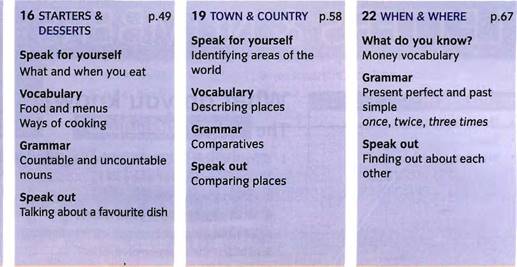 13 HERE & NOW p.40
13 HERE & NOW p.40
![]() What do you know?
What do you know? ![]() Correcting an e-mail
Correcting an e-mail
![]() Grammar
Grammar
Present continuous to talk ![]() about now
about now
![]() Present continuous and
Present continuous and ![]() present simple Writing an e-mail
present simple Writing an e-mail
![]() Speak out
Speak out![]()
![]() Playing a 'present
Playing a 'present ![]() continuous' board game
continuous' board game
|
14 CAI IS & MESSAGES p.43 |
|
20 TICKETS & FLIGHTS p.61 |
23 SHOPS & SHOPPING p.70 |
||
|
Speak for yourself |
|
RESTAURANTS |
Vocabulary challenge |
|
Speak for yourself |
|
How do you keep in touch? |
|
Speak for yourself |
Airport and in-flight |
|
Talking about shops |
|
Vocabulary |
|
Eating out |
vocabulary |
|
Vocabulary |
|
Contact details |
|
English in use |
English in use |
|
Shops |
|
English in use |
|
Understanding restaurant |
|
|
English in use |
|
Taking and leaving |
|
guides |
|
|
Explaining what things are |
|
telephone messages |
|
Booking a table |
Making a telephone |
|
for |
|
Speak out |
|
Speak out |
booking |
|
|
|
Making a phone call, and |
|
Describing a restaurant |
|
|
|
|
15 UPS & DOWNS p.46 |
18 SATURDAY & p.55 |
21 SINGLES & |
64 |
|
|
Listening challenge |
SUNDAY |
DOUBLES |
|
Vocabulary challenge |
|
Different ways of saying |
What do you know? |
|
|
Clothes and colours |
|
How are you? |
Correcting a dialogue |
Holiday accommodation |
|
Vocabulary |
|
Vocabulary |
Grammar |
Vocabulary |
|
Clothes on the Internet |
|
Feelings |
Past simple, regular and |
|
|
English in use |
|
English in use |
|
accommodation guides |
|
Going clothes shopping |
|
Giving advice with should |
last and ago |
English in use |
|
|
|
|
Speak out |
Booking accommodation |
|
Speak out |
|
Speak out |
|
|
|
Talking about clothes and |
|
Discussing problems and giving advice |
|
Speak out Making a hotel booking |
|
clothes shopping |
|
PRACTICE p.76 PAIR WORK ACTIVITIES p.105 TAPESCRIPTS p.107 |
IRREGULAR VERBS p.l l l |
|||

![]()
![]()
![]() taking and leavingBuying things
messages
taking and leavingBuying things
messages
03
What do you know?
The alphabet
1 What do you know about the English alphabet?
1 How many letters has it got?
2 How many are vowels?
3 What do you call the other letters?
4 Which is the most common letter in English? 5 Which is the least common letter?
2 How do you pronounce the letters? Complete the columns.
![]()
c d
|
|
|
3 In pairs. Which letters are difficult to say? Test each other.
|
|
|
• The alphabet • Dates • Numbers |
 |
4 Against the clock Say the alphabet round the class as quickly as you can. Can you do it in 20 seconds?
Names and spelling
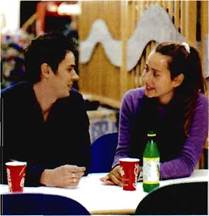
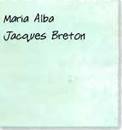 1 Make a
list of the people in your class. Write their names in alphabetical order (by
surname). A Hello / Hi / Good evening. What's your name?
1 Make a
list of the people in your class. Write their names in alphabetical order (by
surname). A Hello / Hi / Good evening. What's your name?
B I'm Jacques.
A And what's your surname? B Breton.
A How do you spell that?
B B-R-E-T-O-N. And you? What's your name?
A Maria Alba.
2 In pairs. Check the names you've aot. Have you spelt them the same?
04
|
nute |
|
|
Useful language |
the third the fourth July. |
5(th) the fifth 6(th) the sixth |
|
Can you continue this list? the first 3(rd) 2(nd) the second 4(th) We write ... 14(th) July. We say . the fourteenth o How do you say these dates? 10 October 21 March 1998 = nineteen ninety-ezght 2004 - two thousand and four |
|||
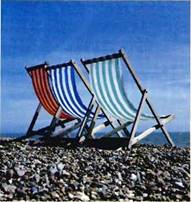 English
in use
English
in use
1 • Against the clockWrite down the names of the months in English. Check your spelling in pairs.
2 In your country, which month is ...?
1 a holiday month 4 a depressing month
2 a hot month 5 an important month for students
3
a
wet month ![]() 6 your favourite month
6 your favourite month
August![]()
![]() s s
s s
![]() 2 3 4 5 6
2 3 4 5 6
![]() 8 9 10 1
1 12 1 3
8 9 10 1
1 12 1 3
14 15 16 ![]() 18 19 20
18 19 20
21 22 23 ![]() 25 26 27
25 26 27
28 29 30 31
3 In groups. Write down four dates when you do something special. Explain them to your group.
9 May On the ninth of May we always go out because it's my sister's birthday.
1 Listen. Match the sentences you hear with the pictures.
2 Listen again and write down the missing numbers in each picture.
3 Make questions for the numbers.
1 what's number ? your phone
2 date ? the what's today
3 old ? how you are
4 ? mobile your number what's phone 5 number house your what's ?
6 ? birthday your when's
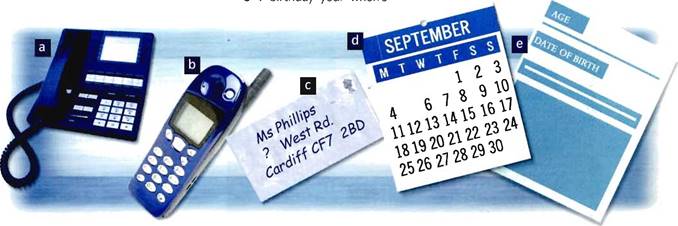
|
01 LETTERS &
NUMBERS |
|
If you don't want to answer the question 'How old are you?', say 'It's a secret.' |
4 a] Listen and check your ideas. Look at Tapescript 1.2 on p. 107 and practise the dialogues.
5 In pairs. Ask each other the questions in exercise 3.
|
|
|
You can answer lots of questions with letters, numbers, and dates. Play this game in groups of four. Use a coin to move. When you land on a square, answer the question. Make sure you say the letters and numbers correctly.
|
|
|
What's the date tomorrow?
start |
What are the vowels in English? |
When were you born?
|
What's your phone number? |
|
What's your ID or passport
number
|
How much money have you got on you?
|
How do you spell your
teacher's name? |
|
|
How many students are there in your class?
|
|
What was the date last Friday?
|
|
|
How do you pronounce 18 and 80? |
How do you spell the surname of
the person on
your left? |
|
|
What's you house or flat
number? |
When does your credit card expire?
|
When's yout birthday? |
How many pages has this book got?
|
Have you got a mobile?
What's the
number? |
|
06 01 LETTERS & NUMBERS
1 Look at the examples and write sentences about yourself with as much information as possible.
I'm from Switzerland.
I'm from
Switzerland, from a small town called Baar![]()
I'm from Switzerland,
from a small town called Baar, near Zürich![]()
I live in a flat.
I live in a flat in the centre of town.
I live with my wife and
children in a flat in the centre of town![]()
• I'm from
![]()
• I live
![]()
2 In groups. Compare your sentences. Who has the longest?
Ask questions for more information.
What's your wife's name?
|
|
|
. Countries E-mail addresses |
 |
1 In pairs. Put these countries in the right stress group. Is your country in the list?
|
|
|
|||||||||||||||||
|
|
||||||||||||||||||
|
|
|
|
||||||||||||||||
|
|
||||||||||||||||||
o 00 00 000 0000
![]()
France Brazil Mexico
![]()
2 Add another country to the table.
|
|
|
|
||
|
EXPAND your vocabulary |
|||
|
When you learn a new word, look for other forms. country nationality France French Mexico Mexican Do you know the nationalities for these countries? Japan Germany
|
|||
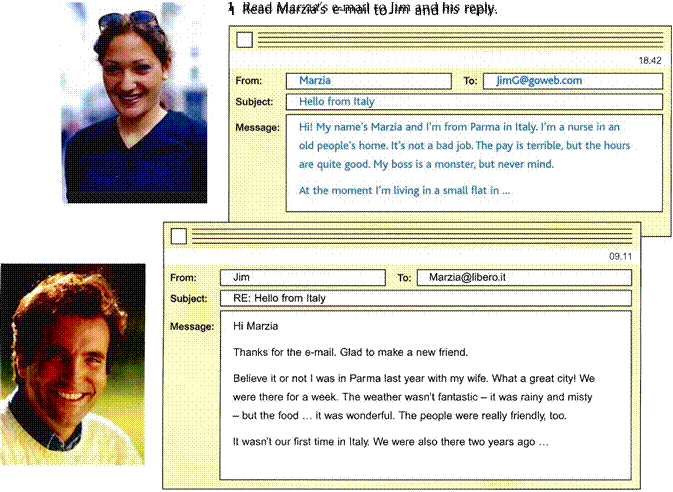
|
ago = in the past Answer these questions:
exactly a week ago? |
2 Close your books and write down three things you remember about Marzia and Jim.
3 In groups. Compare your lists and correct any mistakes.
4 Read about Marzia and Jim again. Underline the examples of to be in the present. the examples of to be in the past.
![]()
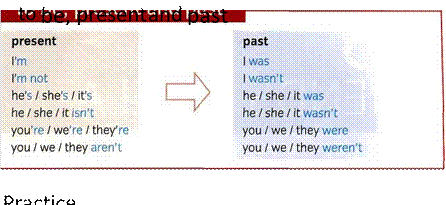 present
present
'm I'm not he's / she's / it's he / she / it isn't you're / we're / they're you / we / they aren't
1 Look at these sentences. Which must be in the past?
![]() 1a
teacher.
1a
teacher.
2born in 1974.
3on holiday two weeks ago.
4
My birthday![]() in July.
in July.
5
![]() married.
married.
6 The weather sunny yesterday.
![]() 7
7
8
9 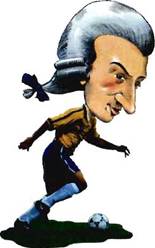 There
There ![]() ten students in my class.
ten students in my class.
10 The date tomorrow ![]() 1 March
1 March![]()
2 Now complete the sentences with to be, present or past. Make them true for you.
I'm a teacher.
or I'm not a teacher. I'm a doctor.
3 In pairs. Talk about your answers.
4 In teams. Write down the names of six famous people, three dead and three alive. Ask the other teams where they are from.
A Where's Ronaldo from? B (He's from) Brazil.
A Where was Mozart from? B (He was from) Austria. speak out
1 Write a short e-mail about yourself.
![]() Can you remember ...?
Can you remember ...? 
five countries and nationalities how to say e-mail addresses
2 In pairs. Read each other's e-mails. the past of to be
3 In groups. Tell the group about your partner. Don't look at their
Practice p.77 e-mail. How much can you remember?
1 Look at these words. What's the difference between the words in red, blue, and green?
grandson
2 In pairs. Look at the red and blue words. What's the other word in the pair? Test each other.
A Father. B Mother ... Wife. A Husband.
|
My brother's name = the name of my brother |
3 In groups. Choose three of your relations and tell each other something about them.
My brother's name is David, and he's married with three children.
|
In this lesson Family vocabulary Home vocabulary • have got / has got Talking about where people live |
1
 |
|
I lived in a large house. It was in a village. There were three bedrooms. There was no electricity. |
now I live in a large city My house / fiat has got central heating. My house / flat has a beautiful view. |
2 Read about Rita and her family.. Which of the sentences in exercise 1 are true for her?
I lived in a large house. X She lived in a small house.
My mother's house is in the village of Kardiani. The house is about 100 years old. My family is big — six brothers and sisters and my mother (my father died when I was 12). It was a small house for seven people. It's got a big living room and two bedrooms. We slept in the bedrooms and the living room. The bathroom was, and still is, outside. It was so cold in winter! Now, I live in my husband's village. I'm near my mother, but not too near! It's a new house, and it's got lots of space, a beautiful kitchen, and a large balcony. We've got heating (which my mother's house hasn't) and a large, comfortable bathroom inside! Unfortunately, we haven't got a very good view. There's another house opposite us, so we can't see the mountains.

3 Against the clock minutes Read the texts again and find as many rooms and parts of a house as you can.
4 Look at this spidergram. Can you put three things in each room?

5 Look back at the text. How many examples ofhave got/ hasgot can you find? How many are negative?
|
|
have got / has got |
Have Has |
Yes, No, Yes, No, |
|
've got you haven't got we they he 's got she hasn't got it |
1 Look at the grammar box and make these sentences true for you.
1
![]() a pet.
a pet.
2
1 ![]() a big family.
a big family.
3 My bedroom an en suite bathroom.
![]()
4
My parents ![]() a house in the country.
a house in the country.
5
My car ![]() air-conditioning.
air-conditioning.
6 My best friend dark hair and brown eyes.
![]()
2 Put these words in the right order to make questions.
1 brothers got many have how and sisters you ?
2 house your got air-conditioning has ?
3 a you player got CD have ?
4 you nephews got and any have nieces ?
5 free much time have how you got ? 6 you have flat house or got a a ?
3 In pairs. Ask and answer the questions.
|
03 FRIENDS & RELATIONS |
11 |
|
rooms |
|
|
favourite room |
living room |
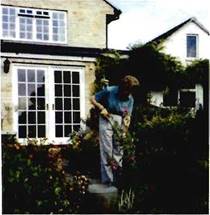
Where do you live?
1 Listen to Diana and Shawn talking about where they live. Complete the table.
Diana Shawn
where a village near Oxford
who with
2 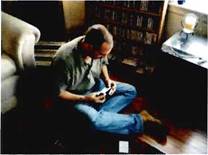 Who
says what? Put D (Diana) or S (Shawn) beside each phrase.
Who
says what? Put D (Diana) or S (Shawn) beside each phrase.
1 about 80 years old D 5 there are three bedrooms 2 on the third floor 6 a view of the garden
3 it's pretty big 7 my favorite room's
4 upstairs 8 that's where I watch TV
3 Listen to the recording again and check. Practise saying the phrases.
4 What can you remember? Try to complete these sentences. Check in Tapescript 3.1.
Diana
|
British English flat favourjte |
American English apartment favorite |
|
3 Upstairs there are three |
and two |
|
|
4 Our bedroom has a view of the |
and the |
beyond. |
|
Shawn |
|
|
|
5 My apartment's on the |
floor of an old |
house. |
|
6 It's big for |
|
|
![]()
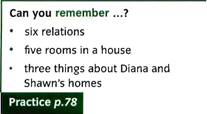
![]()
![]()
![]()
![]() 2
It's about years old and made of
2
It's about years old and made of
7 My favorite room's the . That's where I TV and
to music.
8 It's also where the is - it gets hot in Boston.
5 Write a short description of your house / flat, using the phrases above for ideas. speak out
1 Think of friends or members of your family who live in these places. If you can, write one name for each.

2 In groups / pairs. Choose one or two of the people. Say who they are, and describe where they live. Give as much detail as you can, and try to use words and phrases from this lesson.
03 FRIENDS & RELATIONS
What do you know?
1 Make as many sentences as you can.
I get the bus to work.
up at 7.00.
a shower.
|
I get |
the bus to work. a sandwich for lunch. |
|
I have |
from nine to five. |
|
I go |
hard! |
|
I work |
to bed at about 1 1 .00. home straight after work. in an office. |
to a café for breakfast.
2 Tick (U) the sentences that are true for you. 3 In groups. Compare your ideas.
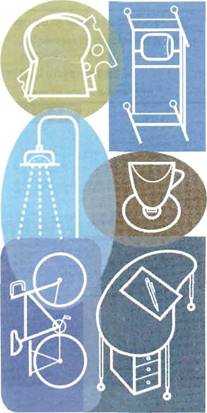

 |
 Daily routines
Daily routines
1 Against the clock minute Look at these words. Can you think of one verb that goes with each?
have a sandwich go by bike work in an office
2 Listen to these three people talking about their daily routine. Complete the gaps. Which expressions in exercise 1 do they use?
1 f usually get up at about 6.30. I just for breakfast.
to work. If I'm late I which is a bit expensive. My wife , she likes to keep fit.
2 I always at lunchtimes, about 12.30 or 12.45. I there too, and I often for lunch.
![]() at around 6.00 and maybe for a drink.
I don't too much to do, and I never before midnight.
at around 6.00 and maybe for a drink.
I don't too much to do, and I never before midnight.
13
3  What
times do these clocks say? Use these words.
What
times do these clocks say? Use these words.
o'clock quarter past / to half past 0000
|
work |
takes |
do |
don't like |
|
|
does |
doesn't drink |
don't watch |
|
|
live |
do |
|
|
goes |
read |
do |
|
1
![]() Complete the sentences with the words in the box.
Complete the sentences with the words in the box.
![]()
1 Mr Yorke in a secondary school in London.
![]()
2
Which newspaper![]() you
you ![]()
3
Alison and Nick ![]() to work by bus. They
to work by bus. They![]() driving.
driving.
4 Sally coffee.
![]()
5 The 26 bus you straight to the city centre.
![]()
6
What![]()
7 They never at the weekend.
![]()
8 She home at 5.00.
![]()
9
Where ![]() your parents
your parents ![]()
10 ![]() a lot of TV.
a lot of TV.
2 In pairs. Check your answers together.
|
|
Present simple |
Do Does |
you he she it |
work , work |
Yes, No, No, |
do. don't. does. doesn't. |
|
work you don't work we they he works she doesn't work it |
04 LIFE & ROUTINE
1 Correct the verbs in these sentences.
1 I am phone her every day.
I phone her every day. 2 We not work at the weekend.
3 How you get home?
4 I'm start work at nine o'clock.
5 She doesn't drives to work.
|
You can use every with periods of time. He has a cigarette every ten minutes. She has a coffee every morning. We go to London every weekend. They visit me every year. |
6 They like living in the United States?
7 Are you always have a sandwich for lunch? 8 Do this bus go to the city centre?
2 Write five sentences with every about things you or other people do.
3 In pairs. Read these tips for getting a good night's sleep. Tell your partner what you do and don't do.
I lock all my doors, but I don't listen to music.
time  every day•
every day•
Go to bed before midnight.
Never eat or work in bed.
Make sure you lock all your doors.
Always leave a window open.
Listen to relaxing music before YOU go to bed.

![]() Can
you remember Never
have a pet in the bedroom with you
Can
you remember Never
have a pet in the bedroom with you![]()
• six phrases to describe your dailya bath before you go to bed. routineHave
• how to tell the timeMake sure the room is dark.
when to use -s with a verbRead a book for ten minutes — but not a horror story.
Practice p.80
1
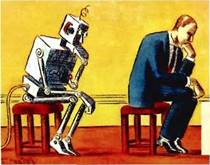 In pairs. Tell your partner about your routine. Use as
many words from this lesson as you can.
In pairs. Tell your partner about your routine. Use as
many words from this lesson as you can.
2 In groups. Tell the group about your partner's routine. Whose is the most interesting or unusual?
Every week is the same. tornetirnes I fee\ like a robot.
Is every week the same for you? Do you sometimes feel like a robot too?
04 LIFE & ROUTINE
Vocabulary challenge
1 Put these adjectives in the right box (some go in more than one).
![]()
freezing friendly relaxed sunny
|
delicious |
horrible |
cheap |
hot |
|
|
interesting |
caring |
boring |
|
|
wet |
tasty |
beautiful |
2
In groups. Which of the adjectives could describe the people,
food ![]() and weather in your country?
and weather in your country?
|
minu |
 English in use
English in use|
Describing people and places Present simple third person Adverbs of frequency |

Describing your life
1 Against the clock Read about Becky and Ruth, two
British women working abroad. What are their jobs? Do you think they enjoy what they do?
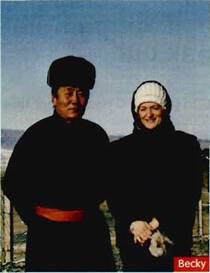 Mongoliapeople I work with are
extremely friendly, caring, and good fun. They're Routinealways worried about
my fiat, my I often wake up with bright sunshinehealth, my eating habits, and
my coming through my bedroom windowsocial life! And I love the weather — — the
best way to start the day! I startMongolia is called Xthe land of
blue work at nine o'clock and finish at six.sky', and it almost never rains.
Mongoliapeople I work with are
extremely friendly, caring, and good fun. They're Routinealways worried about
my fiat, my I often wake up with bright sunshinehealth, my eating habits, and
my coming through my bedroom windowsocial life! And I love the weather — — the
best way to start the day! I startMongolia is called Xthe land of
blue work at nine o'clock and finish at six.sky', and it almost never rains.
I teach university students for four Bad things hours a day, and spend the rest of my
The cold and the distances — Mongolia time planning classes and preparingis a long way from anywhere else, exams with colleagues.a year. and I only see my friends once
Good thingsThe temperature is sometimes around My work's very interesting — I never—20 0 C in winter, it's really freezing. know what will happen next. All theHorse's milk and salty tea are popular drinks, but not with me!

![]()
![]()
![]() Solomon Islandsatmosphere. The
friendly people
Solomon Islandsatmosphere. The
friendly people
who always say hello, and the kids Routinewith smiling faces and orangeClasses start at 7.30 a.m. Weblonde hair. And the local family teach in leaf hut classroomsthat I live with. which badly need repairing. There
Bad things aren't enough chairs and desks,
The insects, the waiting, and the so students who arrive late sit heat. It's
three or four to a desk. There'susually very, very usually a lovely breeze comingbetween January and April. wet
Imported food is expensive, and from the sea 100 metres away.
I'm a bit bored with fish, rice,
I finish at about 3.00, and the and sweet potato rest of the day is my own. I hardly
|
ever work at weekends. |
|
|
|
Good things |
2 |
Read the texts again, then close your books. Can you remember the |
|
The beautiful sunny mornings. |
|
good and bad things about each place? |
|
The tranquillity and the relaxed |
3 |
Are these sentences probably about Becky or Ruth? How do you know? |
1
Every Sunday she
washes her clothes and dries them on the beach![]()
2
 She
teaches children.
She
teaches children.
3 She studies Chinese and Russian in the evening.
4 She goes for a swim when she finishes work.
5 She has fresh fruit for breakfast.
6 She wears three jumpers to work in winter.
7 She goes out with her colleagues a lot.
8 She always takes malaria tablets.
9 She misses her friends.
10 She doesn't have an umbrella.

4 Study the spelling box. How many examples can you find in the sentences in exercise 3?
5 Now complete these sentences. Make sure you put each verb in the correct form.
dry wash miss study
1 ![]() his mother a lot.
his mother a lot.
2 They ![]() to church every Sunday.
to church every Sunday.
3 As my hair is so short, it ![]() very quickly.
very quickly.
4 ![]() hard but I always fail tests and
exams. It's nerves.
hard but I always fail tests and
exams. It's nerves.
5 She her clothes in the river. Their house doesn't have running water.
![]()
6 Listen to these five sentences and write down the verb.
1 How is the verb pronounced?
2 Can you remember the complete
sentences? Listen again and check![]()
05 PEOPLE & PLACES
Can you remember four adjectives to describe weather when to use -es with a verb
• six adverbs of frequency
Practice p.82
1
|
100% |
always |
2
4
5 Test your memory. Complete these sentences about
Becky and Rut![]()
![]() usually never sometimes always often
hardly ever
usually never sometimes always often
hardly ever
![]() wake up with bright sunshine coming
through the window.
wake up with bright sunshine coming
through the window.
2
They're![]() worried about my eating habits and my
social life.
worried about my eating habits and my
social life.
3
It almost![]() rains.
rains.
4
The temperature
is![]() around —200C in winter.
around —200C in winter.
5 work at weekends.
6
It's![]() very wet between January and April.
very wet between January and April.
Can you put the adverbs in exercise 1 in order?
Tick (V) the sentences that are true for you.
1 I always have a cup of tea first thing in the morning.
2 I sometimes go to the beach at the weekend.
3
4 I usually wear a tie.
5 I sometimes go out in the evening.
6 I always buy expensive clothes.
7
8 I never eat chips.
Make the other sentences true by changing the adverb of frequency I never have a cup of tea first thing in the morning.
In pairs. Tell each other your sentences. Ask more questions. A I never have a cup of tea first thing in the morning.
B What do you have? speak out
1
|
They often work in the evenings. |
|
They sometimes have problems with th language. |
what they do every day people, weather, language, food, money, etc.
2 In groups. Compare your ideas.
05 PEOPLE & PLACES
1 Tick (V) the things you think are important in a job.
a good salary working alone lots of travel long holidays working outdoors working at home an interesting routine working in a team
![]()
 [2 a company car
[2 a company car
C] being the boss
C] working in an office working near home
|
|
& |
WORK |
|
In this lesson |
|
• Jobs and occupations • Job adverts • Talking about what you do |
2 In pairs. Tell your partner what you think is important and what you like / don't like.
I think a good salary is important, and I like working in a team.
|
a + consonant I'm a student. an + vowel
I'm an architect. |
1  Can
you answer this question in two ways?
Can
you answer this question in two ways?
1 1'm a student.
2 1 go to the University of Prague What do you do?
|
awyer |
shop assistant |
photographer |
secretary |
|
teacher |
computer programmer |
bus driver |
journalist |
|
nurse |
builder |
|
|
![]()
![]()
![]() 2 Against the clock 2
2 Against the clock 2 ![]() minutes Match these jobs to the
pictures.
minutes Match these jobs to the
pictures.

3 Now match six of the jobs with these sentences.
I spend my whole day typing letters - it's a bit boring.
2 1 like looking after people, but I don't earn much.
![]()
3 1 hate the traffic.
![]()
4 1 work for a small local paper.
![]()
5 1 work in a secondary school.
![]()
6 1 sometimes work on Sundays before Christmas.
![]()
4 Write your own sentences for the other four jobs.
5 Listen to these three dialogues and write down the answers.
1
What
do you do? 2 
3
6 In pairs. Notice the way the words join together. Practise saying then in the same way.
A What do you do?
B I'm a doctor.
7 In groups. Think of two people you know. Can you explain what they do?
1 Match the beginnings and ends of the sentences.
|
1 If you wear good clothes, 2 If you have done a job before, 3 If you speak and listen well, 4 If you want to do well in a job, 5 If you study at university, 6 If you earn a lot of money, |
you get a degree. you are motivated you have good communication skills. you are experienced. you have a high salary. |
|
advertisement = advert ad |
2 Look at the job adverts on the next
page. 1 How many different jobs are advertised? 2 Match the jobs with the words
in exercise 1 ![]()
3 What is 'blue'?
4 Which job needs most experience?
5 What is the minimum salary for the English Lecturer? 6 How can you contact Maria Philips?
06 JOBS & WORK
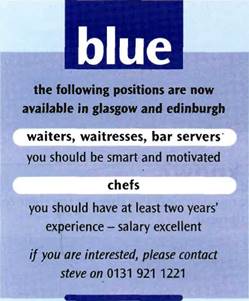
English Lecturer
£15,885 to £23,305
Applicants should have a degree in English,
a teaching qualification, and three years' ![]() experience in an institute of higher
education.
experience in an institute of higher
education.
Good communication skills are essential.
![]() For further details contact:
For further details contact:
Maria Philips,
Langside College, ![]() 50 Prospect Road, Exeter, EX6 3DE
philipsm@langside.ac.uk direct line 01392 345777
50 Prospect Road, Exeter, EX6 3DE
philipsm@langside.ac.uk direct line 01392 345777
![]()
1 Think about your job or a job you'd like to have.
2 
![]()
![]() Make notes on the qualities and
qualifications needed for your job. Try to use language from the English in use
section.
Make notes on the qualities and
qualifications needed for your job. Try to use language from the English in use
section.
qualities qualifications
![]()
Can you remember patient teaching qualifications three things that you think are a degree experienced training important in a job motivated university energetic MSc
• another way to say What's your college smart job?
three things you need to get a 3 In groups. Tell each other about your job / future job. good job a degree.
Practice p.83 For my (future) job I need to be smart.
06 JOBS & WORK
What do you know?
1 Are these activities indoor or outdoor? Put them in the right column. Which can go in both columns?
watching TV going to the cinema jogging playing (football) reading the paper clubbing doing nothing surfing the Net hill-walking snowboarding window shopping eating out
![]()
indoor outdoor
![]()
watching TV
![]()
2 Think of two more indoor and outdoor activities. Compare your ideas.
|
In this lesson |
|
Activities vocabulary Likes and dislikes . -ing forms |

1 Against the clock ihute Memorize the activities above. Then cove them.
2 What do you like doing? Put all the activities you remember in these shapes.

3 In pairs. Compare your likes and dislikes. A I love surfing the Net.
B I don't like it much — it's sometimes very slow.
|
Likes and dislikes |
noun -ing |
love old films I hate working on Saturdays. |
Do you like Yes, I do. Yes, I love it/ them. It's OK, No, I don't Not really, Not much. |
|
I quite like I don't like I hate I can't stand |
4 Look at these -ing forms. What are the spelling rules?
cook cooking practise practising run running

1 Read about these people. Which person is most like you? Why?
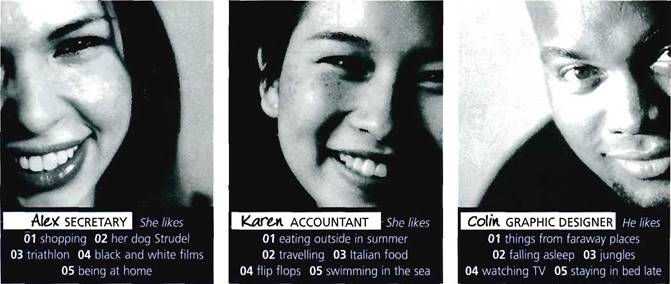
2 Which person do you think likes these things? How do you know?
cycling watching
videos buying Christmas presents ![]() pasta expensive
shoes going to the beach pets comfortable beds tropical
countries
pasta expensive
shoes going to the beach pets comfortable beds tropical
countries
3 Listen co these sentences and underline the stressed word or words. Practise saying them in the same way.
1 I love eating out at the weekend.
![]()
2 I can't stand doing nothing.
![]()
3 I really like watching TV in the evenings.
![]()
4 I quite like clubbing.
![]()
5 I hate reading the paper.
![]()
4 Listen and complete the gaps.
1
![]() the sea, the fresh air .
the sea, the fresh air .![]()
2 Sometimes I just like aroundnothing.
![]()
3
![]() noisy pubs. I can never hear people.
noisy pubs. I can never hear people.
4
I quite enjoy ![]() alone. J don't always need company.
alone. J don't always need company.
![]() when it's still dark.
when it's still dark.
![]()
![]() 6 I quite like football on
the box, but I prefer 7
6 I quite like football on
the box, but I prefer 7![]() gardening. It hurts my back.
gardening. It hurts my back.
8 ![]() the weather here. It's so
depressing.
the weather here. It's so
depressing.
Learn words to talk about what you're interested in or what you enjoy. Think of something you like doing and find five new words to talk about it.

![]()
1 Read this short poem.
I like playing tennis
I like walking
I like going swimming but
I don't like one thing: smoking.
2 In groups. Complete this poem about your group. Ask each other questions to find out three things you all like, and one thing that nobody likes.
![]()
We![]()
![]()
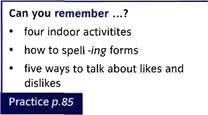
![]() but
but ![]() one thing:
one thing:
3 Read your poems to the class. Is there anything that nobody likes?
24 07 LOVE & HATE
Against the clock 9 minute4 In pairs.
Think of two things you associate with each place.
|
You see |
a film or movie in a cinema. a play in a theatre. an exhibition in a museum. |
cinema film, popcorn
3 Test another pair. Can they guess the place from your words?
A film, popcorn B cinema
4
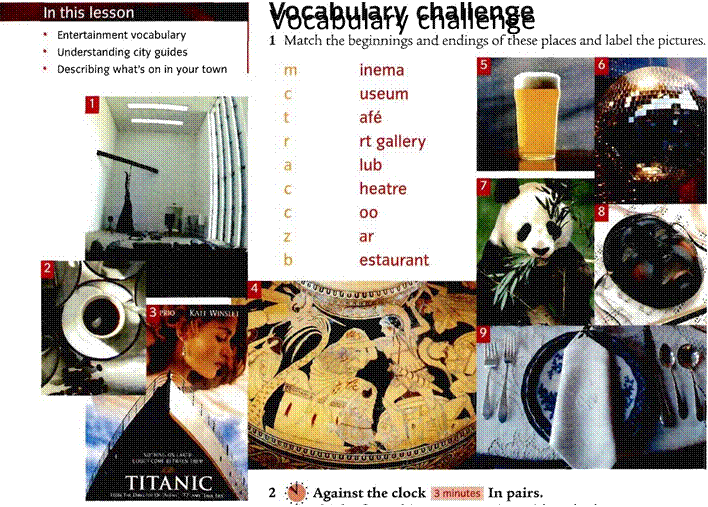
 |
|
once twice three times |
|
a week a month a year |
|
I like going to the cinema / the theatre. but I like going to bars. |
I like going to clubs because I love dancing. I go once or twice a week.
Things to do
1 Complete the definitions with the words in the box. Use a diction to help you.
![]()
concessions is how much you pay to get in.
![]()
a matinée is money you have to pay to book tickets.
![]()
admission is an afternoon show in the cinema or the theatre.
![]()
noon are the words at the bottom of the picture on TV or in the cinenm
![]()
a booking fee are cheaper tickets for students, etc.
![]()
![]() subtitles
subtitles ![]() is the
same as 12.00 midday.
is the
same as 12.00 midday.
![]()
2 Match these abbreviations and words.
 performance matinée
performance matinée
Street Monday admission mat holidays
Rd concessions
St Road
Time Out is a magazine which tells
you what's on in London. 3 Read the extracts from Time Out. Which things do you think you would enjoy?
![]()

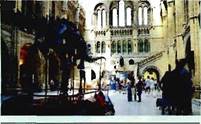
![]() ABC Shaftesbury Avenue WI
ABC Shaftesbury Avenue WI
020 7836 6279, Visa M'Card 020 8795 6403 subject to booking fee
e Tottenham Ct Rd, admission £6.50 (Mon £4.30, Tue-Fri pelfs before 5.00pm £4.30); students, Basketball
|
Natural History Museum |
children, senior citizens £4.30. |
London Leopards v London Tower |
|
020 79389123 |
Seats: screen 1—615, screen 2—581 . |
Brentwood Centre. 01277 215151. |
|
Cromwell Rd SW7 e South |
> East is East (15) Progs 1.30, |
Admission £7.00 (£5.00 children), |
|
Kensington. Mon—Sat I Oam— |
3.50, 6.20 (not Thur), 8.50 > Fast Food (18) Progs 1.10, 3.30 |
Wed. 2 Nov 7.30pm. All tickets sol( |
 5.50pm, Sun I lam—5.50pm. Adults
5.50pm, Sun I lam—5.50pm. Adults
6.10, 8.30
£6.50, children (0—16) free, concs
£3.50; free adm Mon-Fri 4.30- Regained (18) subtitles,
5.50pm, Sat, Sun, and Bank Hols Progs 1.10, 4.30, 7.50 5-5.50pm.
The Breakfast Club
|
Our turning world |
Arch 66 Goding St. SEI I |
Romeo and Juliet |
|
exhibition of 350 photographs by |
6.30am—lpm, £5 no concs, the fun |
Westminster Theatre 020 783402M |
|
Magnum photographers |
continues when everyone else has |
12 Palace St SWI e Victoria S |
|
Barbican 020 75889023 Oct 12; |
gone home to bed, with Lisa Reds, |
5 Nov last perf. Mon—Sat 7.30, We |
|
Mon—Sat IOam—6pm, Weds until |
Roosta and Stormin D. |
Thur & Sat Mat 3.OOpm £15, £10 |
|
8pm, Sun noon—6pm. £6, concs £4. |
|
concs. Runs 2h10. |
4 In pairs. Divide into A and B and answer the questions. Then compare and explain your answers.
|
1 |
The Natural History Museum opens at 10.00 every day. |
TIF |
|
2 |
Students can get into the photography exhibition for £4. |
TIF |
|
3 |
The ABC cinema has seating for over 1 ,000 people. |
TIF |
|
4 |
If you book tickets at the ABC by phone, you have to pay extra. |
|
|
5 |
Which film isn't in English? |
|
|
6 |
Which event has no tickets left? |
|
|
7 |
What's the ABC cinema credit card booking number? |
|
|
8 |
How much is admission to the Breakfast Club? |
|
1 There are four matinée performances of Romeo and Juliet.
2 All tickets for the basketball are £7.
3
You can't go to
the photography exhibition on Sunday mornings. ![]()
4 The Breakfast Club is a restaurant.
5
When can you get
into the Natural History Museum free at weekends? ![]()
6
What time does
the photography exhibition open on Sunday? ![]()
7 Which place has no special prices? ![]()
8 How long is the performance of Romeo
and Juliet? ![]()
5 Write questions for these answers. Use the words in (brackets).
1 020 79389123. (What's)
What's the phone number of the Natural History Museum?
|
2 6.30 a.m. |
(What time) |
|
3 October 12. |
(When) |
|
4 |
(How much) |
|
5 020 78340283. |
(What's) |
|
6 350 |
(How many) |
1 Take five minutes to think about your home town or a city you know. What entertainments and activities are there? Look at the places in this lesson for ideas and make a list. 2 In pairs, A and B.
![]()
Can you remember A Tell your partner what's on.
• six places to go to in towns or There's a cinema with international films (every Friday).
cities There's an excellent Japanese restaurant in the city centre.
![]() Their
speciality is how to use once and twice
Their
speciality is how to use once and twice
B Listen to your partner and decide what sounds interesting.
• what subtitles, noon, and booking The cinema sounds interesting.
fee mean I like the sound of the Japanese restaurant.
Practice p.86
3 Then change round. B tell A what's on.
08 ZOOS & BARS
1 Look at this student's map of Kinshi, a suburb of Tokyo. Can you find these places?
![]() two places to eat • somewhere to go
shopping
two places to eat • somewhere to go
shopping ![]() two places to drink somewhere to see films • an important road a park
two places to drink somewhere to see films • an important road a park
![]() a bus stop and a train station where
the student lives
a bus stop and a train station where
the student lives
ShoppiV13
C enrre ßU5
TOKY0 STATION
H0TEL Shop Station
|
ROADS |
& |
ROUNDABOUTS |
|
this lesson Places in a town / city Asking where places are
|
![]() MAIN STREET
MAIN STREET
|
ðRA
|
3 |
|
|
|
|
|||
|
Min |
N) 2 Against the clock 3 minutes Draw a map of the centre of your hom town. Include some of the places above if you can.
3 In pairs. Compare your maps. Describe them, and ask questions.
How do you get to the centre?
How long does it take you to get there?
Where do you work / study?
How often do you go to the centre? Why?
English in use
1 Look at the map. How many different words can you find? Make an alphabetical list.
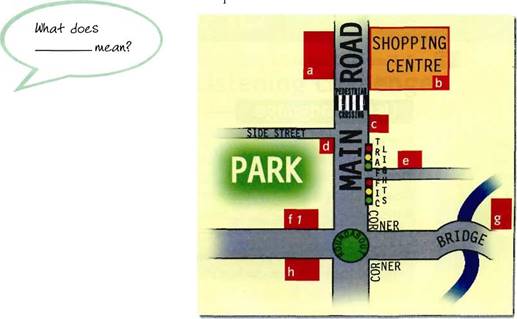
2 Now listen and mark these places on the map.
I museum 3 post office 5 Italian restaurant 7 chemist's
2 Chinese restaurant 4 art gallery 6 cinema 8 supermarket
3 What did the second people say? Complete these sentences with the correct preposition.
1 Yeah, it's the roundabout.
![]()
2
Yes,
it's ![]() that side street,
that side street, ![]() the
traffic lights.
the
traffic lights.
3
Yes,
there's one just down there, ![]() the lights and the shopping centre.
the lights and the shopping centre.
4 Yes, it's there the corner.
5
Yes,
keep going, it's ![]() the
bridge.
the
bridge.
6 Do you know the museum? It's there.
![]()
7
Yes,
there's one![]() that big shopping centre.
that big shopping centre.
8 Yes, it's this main road, the left.
4 Listen again and check.
|
Prepositions 1
near opposite on next to between in 2 • Against the clock 2 minutes How many sentences can you make about Kinshi with the prepositions? The hotel is near the station. |
|
09 ROADS R UNDABOUTS 29
1 Look at these questions. Which do you think are more polite?
A Where's the bus station?
A Excuse me, is there a
B Could you tell me where post office near here? the bus station is?
B Is there a post office?
2 Listen and repeat the polite questions. Make sure you stress the plac
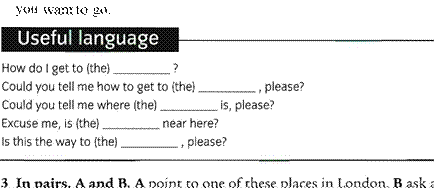 3 In pairs, A and B. A point to one
of these places in London, B ask polite question from the box above. the
Barbican Centre
3 In pairs, A and B. A point to one
of these places in London, B ask polite question from the box above. the
Barbican Centre
the National Gallery Paddington Station
Victoria Coach Station the Museum of the Moving Image the Westminster Theatre the Tate Gallery Speak out
1 Look at this map. Can you pronounce the names of the streets?
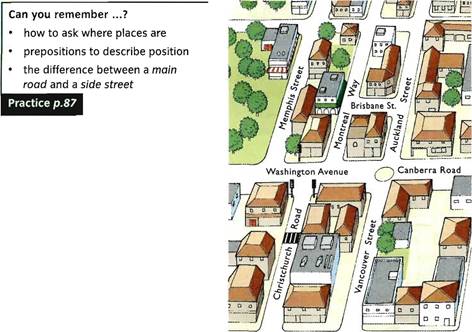
2 In pairs, A and B. A look at the map on p. 105. B look at the map or
p. 106.
![]() 09 ROADS & ROUNDABOUTS
09 ROADS & ROUNDABOUTS
1 Look at these adverts. What are they for?
3 Oscar nominations
|
|
|
![]() A film by Manolo Han Now showing at ABCs
round the country
A film by Manolo Han Now showing at ABCs
round the country
|
John Blake retrospective 60 years of painting and sculpture Hogg Gallery, WI |
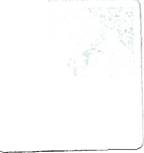
![]()
![]()
![]() 'The best
novel of the 21st century'
'The best
novel of the 21st century'
|
In this lesson |
|
Adjectives for good and bad • Giving your opinion • quite, really, absolutely |
Royal Queen's Hall by Helen K. Shapiro
020 79904241 Country Press
|
[1] |
Listen to these six people. Which advert are they talking about? How do you know?
Opinion adjectives

2 Against the clock minute Look at these words and phrases and put them in the chart. Use a dictionary if you want.
![]() fantastic awful not very good disappointing excellent very
good OK
fantastic awful not very good disappointing excellent very
good OK
3 In pairs. Practise saying the adjectives from exercises 1 and 2. Which have two or more syllables? Which syllable is stressed?
disappointing = dis + a + ppoin + ting
|
31 |
![]()
best
Bond, but Pierce Brosnan is terrific, too! Robert Carlyle is a bit
disappointing as the bad guy, though.
Best bit? The scene at the beginning when Pierce Brosnan jumps out of the window in Bilbao. Very exciting.
Why? = Why did you go to see the film?
Well? = Well, what do you think of the film?
Best bit? = What was the best part?
|
Brosnan's nice, and I really like Sophie Marccau — she's a brilliant baddie. Best bit'? The scene when Brosnan and Marceau are skiing in the mountains. |
It's quite shocking when Bond kills a woman -- he's usually such a gentleman! Best bit'? The chase with the speed boats in the Thames. Bond's boat is really cool. |
2 Cover the texts. Ask each other questions, and complete the rest of th table.
B What does Adam like in the film?
A Pierce Brosnan and the scene at the beginning.
3 How many stars (Z ![]() ) do you think each person gives the film?
) do you think each person gives the film?
|
Useful language |
|
Look at the opinions again. Find three words that we can use before adjectives to change their meaning. Which two are strongest?
![]()
You can use
absolutely to give very strong opinions using ![]() or words.
or words.
Positive ![]() It
was absolutely fantastic.
It
was absolutely fantastic.
![]() great.
terrible.
great.
terrible.
awful.
Practice
u]
Can you remember ...?
• three positive and three negative adjectives
. and how to pronounce them
• how to use absolutely
Practice p.89
1 Listen to these people giving their opinions. Can you complete the sentences?
![]() What did you think of the book?
What did you think of the book?
B It was ![]()
![]() How was the film?
How was the film?
B I thought it was![]()
![]() What was the restaurant like last
night?
What was the restaurant like last
night?
B The food was ![]()
![]() How was that exhibition you went to?
How was that exhibition you went to?
B It was ![]()
![]() How was the book?
How was the book?
B I thought it was![]()
![]() What was the concert like?
What was the concert like?
B It was ![]()
2 Listen to the answers again and mark the main stresses. Practise saying the sentences.
It was really good.
3 Look at this dialogue. Can you think of three possible questions for B? Check your ideas in exercise 1.
A I went to that new Japanese restaurant last night.
![]()
A It wasn't bad - a bit expensive, but the food was quite good.
![]()
4 In pairs. Make similar dialogues with this information.
• that new club last night/ absolutely awful / décor cheap / music terrible
• an art exhibition yesterday / not very good / paintings OK/ photos nothing special
• that new café this morning / excellent/ building beautiful / coffee fantastic
5 In groups. Think of two things you did last week. Did you enjoy
them? Can you explain why / why not? speak out
1 On four separate pieces of paper write the names of:
• ![]() a
famous actor a film
a
famous actor a film
• a singer/ musician
• a sports personality
Make sure you choose two that you like and two that you don't like.
|
To say what you think, use: I agree. I don't agree. I think . |
2 In groups. Put all your pieces of paper together. Choose one and talk about your opinions. Try to use adjectives from this lesson, and very, really, quite, and absolutely. Do you all agree? A I really like Kevin Spacey. He's absolutely fantastic. B I don't agree. I think he's really boring.
10 GOOD & BAD
|
In this lesson Making plans Present continuous for plans Spelling -ing forms |
1 Most of us like the weekend. But what is your favourite time and why? Put an X in the chart and write a sentence.
|
Friday |
|
|
|
|
|
|
|
|
|
|
My favourite time is Sunday morning because I can sleep late and read the paper in bed.
2 In groups. Compare your ideas. Is anybody the same?
Saturday3 How often do you do something different for the weekend? What do you do? Sunday
•000 000
Present continuous for plans
1 In groups. Put the boxes in order to make two conversations, a-h and 1-8.
7 What are you doing this weekend?
Absolutely. Well, have a great time. And see you on Monday.
|
|
Well, we're driving so we can pick you |
We're going to Paris! |
|
|
up. About 7.45? |
Jane saw a special offer, |
|
are you leaving? |
|
£69 all in, so we thought let's go for it. |
Oh, nothing much Shopping, maybe, and a bit of telly.
Fantastic! When
Yeah, but we're not staying anywhere very nice, I don't think. But anything's OK for £69!
That sounds great where are you going?
|
|
Well, if you feel like it, Bella and I are going out |
|
|
That Italian place, |
for dinner on Saturday, |
|
|
Umberto's. The food's really |
and you'd be more than |
|
|
excellent. We're meeting Keith there at 8.00. Do you know where it is? |
welcome to come. We're getting the |
|
|
|
train on Friday |
No, don't actually. |
|
h |
evening, at 7.30. |
|
And is everything included?
Accommodation and
8 OK. See you then.
2 Listen and check your answers.
3 Cover the conversations. Can you complete these sentences?
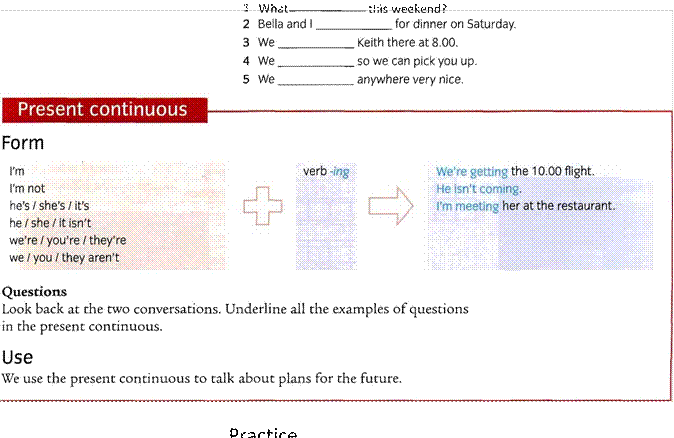
|
Look at these verbs. What are the -ing forms? swim leave took |
1 Put these words in the right order to make answers to questions.
1 coffee Mary meeting a I'm for
2 restaurant going a Chinese I'm with friends to some
3 TV and in watching staying
4 special nothing
5 for I'm down going London to day the
6 parents spending my I'm couple days of with a
2 Listen and check your ideas.
3 What do you think the questions are?
4 Listen to the complete dialogues. Write the questions down.
1 Which answer in exercise 1 can go with all the questions?
2 In pairs. Ask each other the questions. A What are you doing after this lesson?
B I'm![]()
![]()
1 Work on your own, and choose three things to do this Saturday, and three things to do on Sunday. Mark them:
M = morning A = afternoon e evening
![]()
Saturday Sunday
![]()
|
clothes shopping |
tennis |
|
swjmmjng |
exhjbjtjon |
|
football match |
beach |
|
opera |
restaurant |
|
cinema |
theatre |
|
your own idea |
your own idea |
![]()
2 In class. Go round the class and find someone with a similar plan.
A What are you doing on Saturday?
B In
the morning I'm and then I'm .![]()
![]()
3 Sit with your partner. Make detailed plans to do the things
Can you remember together. Think about
these things. the most popular weekend time for your class![]() When
/ Where are you meeting?
When
/ Where are you meeting?
how to form the present • What (film) are you seeing? continuous • Which (restaurant) are you going to? how to spell -ing forms
4 In groups. Present your plans. Ask more questions. Continue until
Practice p.90
everybody has talked about their plans.
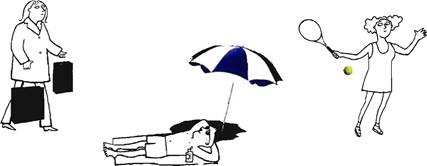

1 1 OUT & ABOUT
1 Taxis are cheap. 1 There aren't enough buses.
2 You can always find one when you need one.
3
People
often share taxis.![]()
1
Lots
of people travel by train![]()
2 Trains are usually late.
3 They're comfortable and clean.
2 There is always somewhere to sit. 3 Buses run late at night.
1
Lots
of people use bikes![]()
2 People often walk to where they want to go.
3 Ferries are an important form of transport.
Try to learn words in groups, e.g. train -+ station, platform, ticket. What groups can you make for plane or bus?
Using public transport

1
![]()
![]()
![]() Listen and match the dialogues and the pictures.
Listen and match the dialogues and the pictures.
2 Listen again and complete these sentences.
1 Could you ![]() please?
please?
How![]()
Keep
the![]() And
And ![]() a receipt, please?
a receipt, please?
2 Is this ![]() Glasgow?
Glasgow?
What time does it 7
3 What's to get there?
4 Sorry, ![]() did you say?
did you say?
5 ![]() to London, please.
to London, please.
3 Look at Tapescript 12.1 on p. 108. Write down four words from each dialogue. Then close your books and practise the dialogues from memory
|
Useful questions |
|
|
|
Look at these questions. Which can you ask during a journey?
|
1 What's the best way to get there? 2 How much is that? 3 Is the flight direct? 4 Do I need to change? 5 How far is it? 6 How long is the journey? |
7 Is it better to fly or go by train? 8 Where does the bus leave from? 9 What time do we get there? 10 Could you stop here, please? 1 1 Is this the bus for London? 12 How often do the buses go to the city centre? |
![]()
1 Match the Usefrl questions to these answers.
No, you have to change in Singapore.
Two and a half hours.
Probably by taxi.
It depends — flying's much faster.
Yes, sure.
No, it's direct.
£27.50.
About 50 miles.
The central bus station.
|
What's the difference between How long ... ? and How far ... ? Write a question with each. |
![]() [2 No, you
want the blue one over there.
[2 No, you
want the blue one over there.
Just after 1 1 .00.
![]() [2 Every ten minutes or so.
[2 Every ten minutes or so.
12 TRANSPORT & TRAVEL
2 Listen and check your ideas.
3 In pairs. Practise the dialogues.
4 Against the clock minute Put these words in order to make questions.
1 Which is London from the train platform leaving to ?
2 How London is train from the late ?
3 Which is gate the at flight to boarding Newcastle ?
![]() flights British Airways leave do from ?
flights British Airways leave do from ?
5 When it arrive does ?
5 Now listen to these announcements. Can you complete the answers to the questions in exercise 4?
![]()
Can you remember ...? 1 The train to London Paddington is leaving from platform not platform
• six forms of transport
2 The train from London King's Cross is minutes late, and is now arriving
![]()
• five useful transport questions at 17.15
![]()
• ![]() the difference between how long 3
Flight BA1462 to Newcastle is now boarding at gate and how far
the difference between how long 3
Flight BA1462 to Newcastle is now boarding at gate and how far
4 All British Airways flights leave from terminal
![]()
Practice p. 91
5 The flight takes 55 minutes, and arrives at local time.
![]()
Speak out
1 Think of three or four cities in your country or a country you know. How can you travel between them? Which is the best way? Think about these things.
• how long?
• how much?
• how often?
-+ the best way?
2 In groups. Discuss your ideas.
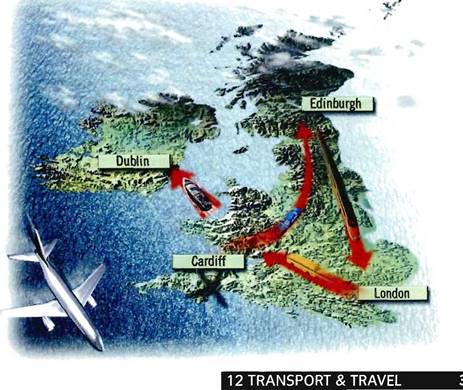

![]() What do you know?
What do you know?
1 In pairs. Read the e-mail below from Vladimir to a friend in Liechtenstein. How many mistakes can you find?
1 2+ excellent 8-1 1 good 5—7 not bad try again
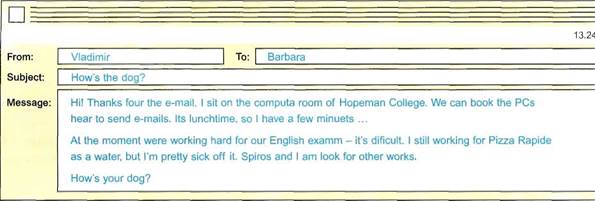
2 In groups. Compare your ideas. How many mistakes have you got nov 3 Share your ideas in class.
1 Read what these people are saying on their mobile phones. Match their words to the pictures.


to now or the future?
|
|
Present continuous for now |
use the present continuous to talk about what we're doing now days. It's used a lot for talking on mobile phones. into the supermarket now. (said on a mobile phone) driving lessons at the moment. (talking about these days) it with the present simple. supermarket every day. have a driving lesson on Thursdays. |
|
Form Use
to be verb -ing We can or these I'm going Look back at p.35 in lesson 1 1 . I'm having Compare I go to the I usually |
1 Listen to these three messages on answering machines (don't fill in the spaces).
![]()
1 You have one message. Please wait.
![]() Hi,
it's me. I'm on the train. We
Hi,
it's me. I'm on the train. We ![]() just
just ![]() the
station, and it
the
station, and it ![]() still
still ![]() .
The train's really busy tonight, but at least it's not late, so I should be
home soon. I
.
The train's really busy tonight, but at least it's not late, so I should be
home soon. I ![]() a burger right now, so don't worry
about dinner. you.
a burger right now, so don't worry
about dinner. you.
2 You have no old messages and one new message.
Hi, it's Michael. I ![]() a
couple of beers in the pub with
a
couple of beers in the pub with
![]() John,
so I'll home a little late. the
dinner warm! Bye.
John,
so I'll home a little late. the
dinner warm! Bye.
3 You have one new message.
Hi, just me. We're on our way back
now. Mary wants to pop into the supermarket first. Just what I need ... my feet
![]() me. Can you in a pizza? Thanks. Bye.
me. Can you in a pizza? Thanks. Bye.
![]()
2 In pairs. What can you remember? Try to fill in the missing verbs. 3 Now listen again and check. Which verbs are in the present continuous?
4 Choose the correct form.
1 I usually get / I'm usually getting lots of e-mails.
2 I'm walking / I walk the dog. I'll be home soon.
3 I'm in the bank. I'm cashing / I cash some cheques. 4 On weekdays we get up / we're getting up at 7.00.
5 Postmen do / are doing a lot of walking.
6 A Where's Jack?
B He's fixing / He fixes the light.
5 Write your own e-mail. Use these cartoons and prompts. Remember to use the present continuous.
![]() say
where you are and what you discuss your present situation and say are doing
what you are doing to change things
say
where you are and what you discuss your present situation and say are doing
what you are doing to change things
![]() talk
about the weather • ask a question
talk
about the weather • ask a question
 These
days
These
days
13 HERE & NOW
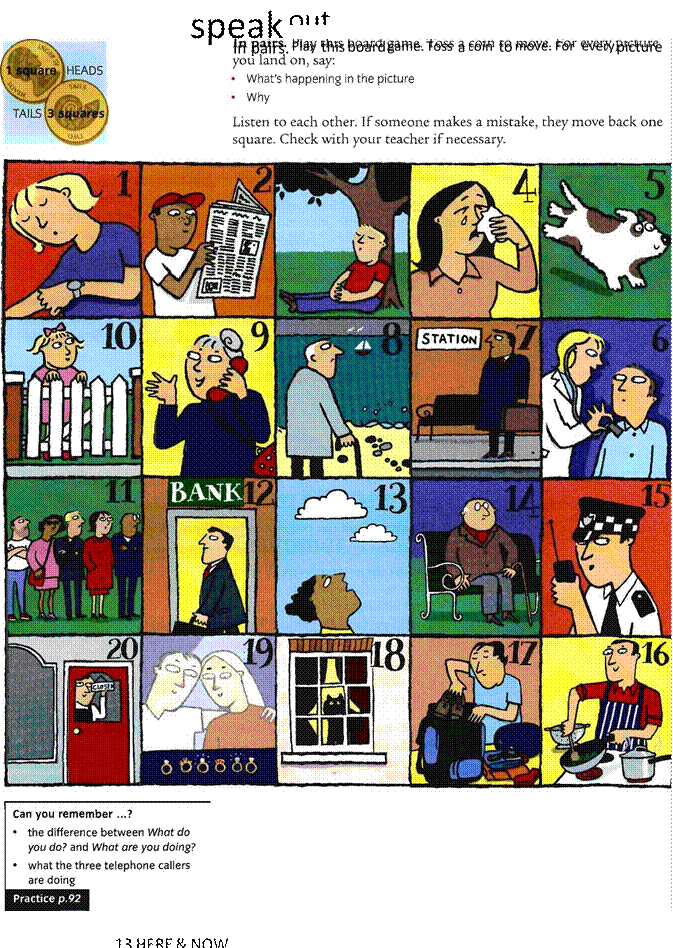
1 Against the clock mihÛfes How do you communicate?
Put an Xon each line and write sentences about yourself. I write letters now and again.
![]() I write
lots ofI never write letters.letters.
I write
lots ofI never write letters.letters.
I send
e-mails ![]() I never send every day. e-mailS.
I never send every day. e-mailS.
|
Use these words and expressions to help you: now and again = sometimes hardly ever = not very often (quite) often |
I use a mobile![]() I can't stand all the time. mobiles. I use
the
I can't stand all the time. mobiles. I use
the ![]() I don't often phone a lot. use the phone.
I don't often phone a lot. use the phone.
I meet up with my![]() I hardly ever friends most days. see my friends.
I hardly ever friends most days. see my friends.
2 In groups. Compare your ideas. Are you similar or different?
1 Match the words with the parts of the business card.
|
lesson How you keep in touch Contact details Taking and leaving phone messages Saying phone numbers |

2IT Consultant
![]() telephone number fax number job title
telephone number fax number job title
320344 Mack Avenue
Grosse Point Michigan 48236 4
5 (31 3) 278-1 351 6
(31 3) 278-1 355 (fax) skyring@holder.com8 www.holderent.com9
|
Some business numbers have extension numbers: Extension 783 |
2 In pairs. A look at p. 105 and B look at p. 106. Find the missing information on your business cards by asking questions. What's the address / zip code / fax number?
|
44 is usually double four, but you can say four four. 0 is usually oh, but people also say zero. |
3 How many phone numbers do you have? Tell your partner what they ar
My
home number is .![]()
My
office / work number is .![]()
Taking and leaving messages
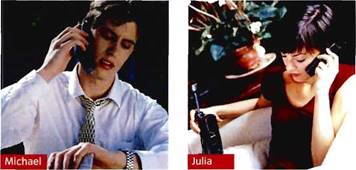
1 Listen to this telephone call and complete the message.

2 Turn to p. 108. Listen again and read Tapescript 14.1. Is there anything you don't understand?
|
Useful language |
|
What can you remember? Fill in the missing words.
caller receiver
![]() Julia?
Julia? ![]()
![]() It's
Michael No,
It's
Michael No,
Is
Robert ![]() Can I a message?
Can I a message?
Yes,It's Just let a pen.
![]()
the meeting. What number can he
![]() Can
he
Can
he![]() back
back ![]()
before 9.00?
![]()
14 CAL & MESSAGES
1 Against the clock minutes In pairs. This phone conversation has 12 mistakes. Can you find them and correct them?
![]()
Jim Hello, is this Deirdre?
|
Deirdre |
Yes, talking. |
|
Jim |
I am Jim. Is George here? |
|
Deirdre |
No, I'm sorry. He's at the library. Can I write a message? |
|
Jim |
Yes, please. It's of our meeting tomorrow. Can he phone to me back before 7.00 this evening? I'm going out then. |
|
Deirdre |
0K, just let me take a pen. Right ... before 7.00. What number can he give you on? |
|
Jim |
334 6885. |
|
Deirdre |
That's 334 6885. Fine. |
|
Jim |
Great. Thanks, Deirdre. Hello. |
|
Deirdre |
OK. Hello. |
2 Listen and check your ideas. 3 In pairs. Read the message.
Rachel phoned. Can you oatl
1 Write the telephone dialogue to fit. back on "$777 2 Practise your dialogue. beQore 10.00 -tonight?
/+5 abov+ the oar. 4 In groups. Perform your dialogues for one another.
1 In pairs. Look ac the roles below. Take one each.
|
If you have problems understanding people on the phone, say: Could you say that again, please? Could you speak a bit more slowly, please? |
|
non Çcctinq and gou |
you don't know her mother's phone |
|
can ik go. |
umber. |
|
|
OCCer +0 fake a message. |
|
phonc. |
Write down the message. |
![]() You and {our -Gricnd c.)cnng yov are
Uenny'5 Clatma-te. man-ecd +0 go +0 khe- cinema Lenny i5 at her mother's kwse
komomon. Cor dinner.
You and {our -Gricnd c.)cnng yov are
Uenny'5 Clatma-te. man-ecd +0 go +0 khe- cinema Lenny i5 at her mother's kwse
komomon. Cor dinner.
you arc
You arc in bcd, bu+ c)cnng can phone kiruc.
Can you remember Lcavc a messaqc u)i+h hcr $ta+makc.
• six things that appear on a
business card Remember +0 Sag mho gou arc!
the difference between a zip code and a postcode 2 Sit back to back. Practise your telephone conversation. When you how to introduce yourself on the have finished, check that the message is correct. phone
3 In new pairs. Change roles and have the conversation again. This
Practice p.93
time, close your books.
14 CALLS & MESSAGES
1 Listen to these people meeting their friends. How does each person start the conversation?
![]() 1 Against the clock 3
minutes In pairs. Put these words in the right column. Use a dictionary to help
you. worried nervous bored fed up excited tired relaxed stressed happy
1 Against the clock 3
minutes In pairs. Put these words in the right column. Use a dictionary to help
you. worried nervous bored fed up excited tired relaxed stressed happy
![]() feeling bad worried
feeling bad worried
![]()
 2
Can you add any other words to describe feelings?
2
Can you add any other words to describe feelings?
3 Complete these sentences with words from the chart. There can be more than one answer.
|
You can say I'm nervous, I feel nervous, or I'm feeling nervous — there's no difference. |
1
1'm really ![]() about my exam.
about my exam.
2
1'm going on
holiday tomorrow — I feel very ![]() about it.
about it.
3
1'm so![]() My boyfriend's late, I'm cold, I've
got no umbrella, and now it's raining!
My boyfriend's late, I'm cold, I've
got no umbrella, and now it's raining!
4
1'm ![]() I'm going to bed.
I'm going to bed.
5
The film was
three hours long — I was so ![]()
6
My mum's feeling
really ![]() her cat died at the weekend.
her cat died at the weekend.
4 Listen. How do these sounds make you feel?
1 Look at the people in the pictures. How do you think they are feeling?

Il

|
Can you remember two other ways to say What's the problem? |
2 Now listen to the conversations and match them to the pictures.
1 Do they use the same words as you did to describe their feelings? 2 Why are they feeling that way?
3 Listen to conversation 3 again. This time the friend gives some advice. What does he say? Complete his words.
![]()
![]() You
You ![]() to your boss about how you feel, and
you so many hours. You've got a life to live!
to your boss about how you feel, and
you so many hours. You've got a life to live!
15 UPS & DOWNS 47
![]()
1 What words do we use before a verb when
we want 2 Write your own examples, one positive (+) and to give someone advice?
one negative (—). ![]() When you're tired you
When you're tired you![]()
![]() When
you're ill you
When
you're ill you![]()
3 Compare your ideas with a partner.
![]()
4 In pairs. Look at this conversation. What advice would you give?
A You don't look very happy. What's the matter?
![]()
B Oh, I've got an exam today and I'm so nervous. I really don't feel very well.
![]()
5 Practise the conversation with your piece of advice.
6 Now listen and compare your advice with the advice on the recording. Whose is better?
Speak out
![]() Can you remember
Can you remember
• three other ways of saying How are you?
• eight adjectives to describe feelings
• how to give advice
2 In pairs. Find out more about each other's problems and try to give
Practice p.94
advice.
15 UPS & DOWNS
1 Look at this menu. Which dishes are vegetarian?
![]() baked potato with
baked potato with
Cheese • tuna mayonnaise
. baked beans
• chilli con carne
2
![]()
Look
at the menu again and complete the table.
![]()
adjectives verb food
![]()
ba
k ed to bake potato![]()
gr ![]() s
s
![]()
t
|
If you know ways of cooking, you'll understand menus more easily. Think about potatoes. How do you like them? |
![]()
![]()
![]()
![]() d
d
3 Try to think of one other food that goes with each verb.
49
4 How do we make the adjective from the verb? Which adjective is different?
5
In
groups. Find the words that sound the same in A and B and ![]() another
of your own. Practise pronouncing them.
another
of your own. Practise pronouncing them.

![]() SOUNDS
SOUNDS![]() SOUNDS
SOUNDS![]()
![]()
![]() LIKE
LIKE ![]() LIKE
LIKE ![]()
![]()
6 In pairs. Write sentences about yourself with adjectives from exercise 2. Read them to your partner.
I like grilled fish.
I really hate boiled potatoes.
Countable and uncountable nouns
1 Think of your fridge. Make a list of everything in it. Use these headir
dairy products
drinks
fruit / vegetables
meat / fish
other
![]()
|
Countable |
Uncountable |
|
There are
some |
There's
some |
|
There are
no |
There's no
|
|
Are there
any |
Is there
any |
|
How many |
How much |
![]()
2 Write some sentences to describe what's in your fridge. Use the phrases in the box above.
There are some eggs in my fridge, but there's no butter.
16 STARTERS & DESSERTS
1 Correct the mistakes in these sentences.
1 Have you got any brown breads?
2 Do you want some spaghettis?
3 There's no apples.
4 How many coffee shall f buy?
|
ml ute |
5 ![]() How much sandwiches are there for
lunch? 6 Can you buy some fruits?
How much sandwiches are there for
lunch? 6 Can you buy some fruits?
2 Against the clock Make a typical shopping list for people in your country. Include about ten items.
3 In pairs. Compare your ideas. Do you think that the list is different for different countries? If so, how?
|
EXPAND your vocabulary |
|
If words have an 'opposite', learn the opposite too. expensive / cheap, open / closed. What are the 'opposites' of these words? delicious red wine black coffee sparkling mineral water strong coffee |
Can you remember
• three vegetarian dishes
• five cooking verbs
• the difference between how much and how many
Practice p.94 speak out
1 Think of a dish you like eating. Prepare to describe It - use these questions to help you.
•
![]() What's it
called? What's in it?
What's it
called? What's in it?
Is it hot or cold?
Is it a summer or winter dish?
Do you eat it on special occasions? When / Where?
2 In groups. Describe your dishes. Which would you most like to try? Why?
16 STARTERS & DESSERTS
1 In pairs. Look at these headings from
an Edinburgh restaurant gu ![]() Can you think of a typical dish or type of food for each kind of
restaurant?
Can you think of a typical dish or type of food for each kind of
restaurant?
THE BEST FAR-EASTERN RESTAURANTS FOR BURGERS AND STEAKS
THE BEST COFFEE SHOPS
THE BEST VEGETARIAN RESTAURM THE BEST CHINESE RESTAURANTS
THE BEST ITALIAN RESTAURANTS
2 Read these descriptions of restaurants and match them with the headings on p.52. Underline the words that tell you.
3 One restaurant doesn't have a heading. Which one? What do you think the heading should be?
|
PHENECIA 662 4493, 55-57 Nicholson st, on corner nr Edin Univ. Yellow Spanish/N African eaterie with couscous, Jots of grjJJed meats and wide vegn choice. Poss to eat v cheaply at lunchtime — some people just pop in for hummus and salad. Lunch Mon—Sat, LO 1 1 pm daily (1 Opm Sun). INX. |
CAFÉ FLORENTIN 225 6267, 8 st Giles street, uptown café with downtown décor, this place combines a range of croissants and wicked tarts with a blast of caffeine, for lawyers and students alike. Open 7.00am to 1 1 pm daily (2am Fri—Sat). CHP. |
THE ROCK 555 2225, Commercial St. Where to go for lunch or dinner when all you want is a steak/burger and chips (there are other options). Best in town. MED.
|
CAPRICE 554 1279, 325-331 Leith Walk. Old-style — hasn't changed much since the '70s. Pizzas baked to order in a wood-burning oven, kitsch décor but kids love it. It gets busy with families at peak times. Lunch Mon—Sat, LO 1 1 pm Mon—Thu, 1 1.30pm |
ORIENTAL DINING CENTRE 221 1288 8 Morrison St. opp cinema complex. A restaurant and a late-night dim sum and noodle bar. Noodles 5.30pm — 2.30 am Mon-Sat. Restaurant 12 noon—1 1.30pm daily. INX. |
Fri—Sat, IOpm Sun. INX.
ISABEL'S 662 4014, 83 Clerk st V small café selling vegn standards. No smk. Mon—Sat 11.30am—6.30pm. CHP.
DARUMA-YA 554 7660, 82 Commercial St.
|
Japanese dining is often expensive, but at last one that is affordable. Bargain set meals. Lunch Tue—Sat, LO 10.30pm Mon-Sat a Sun. MED. |
CHP = cheap = less than £12 a head INX inexpensive = £12—20 a head MED = medium = £20—30 a head |
|
Abbreviations are often used in guides. What do you think the abbreviation for expensive is? |
4 ![]() Find the abbreviations for these
words in the restaurant descriptions.
Find the abbreviations for these
words in the restaurant descriptions.
vegetarian very last orders closed
5 Against the clock 9 minute Answer these questions.
1 Where can you go for an early morning cappuccino?
2 What's the phone number of Isabel's? 3 When are last orders at Daruma-Ya?
4 When can you not have lunch at Caprice?
5 Where can you eat noodles?
6 Which restaurant has cheap meals?
7 What does £20 a head mean?
8 How much is a meal for two at the Rock?
6 In pairs. Write three questions of your own and test another pair.
17 CAFES & RESTAURANTS
![]()
Can you remember three headings from the restaurant guide
• what nr, vegn, and Mon mean? three questions you're asked when you book a table
Practice p.96
Booking a table
1 Listen to this conversation and complete the gaps. Waiter Hello, Caprice.
![]()
Customer Hello, I'd like to a table, please.
Waiter Certainly, when
Customer This evening, at about 8.30.
![]()
Wa iter people?
![]()
Customer Six.
Waiter Right, let's have a look. Yes, that's fine. And the
Customer Lambeth, L-A-M-B-E-T-H.
![]() Waiter
Waiter
Customer Yes, 554 2888.
![]()
Waiter Great. See you at 8.30, Mr Lambeth.
![]()
2 Check your ideas in Tapescript 17.1 on p. 109.
3 In pairs. Look at the restaurant guide again. Choose a restaurant and make a dialogue to book a table there.
1 Choose a restaurant you like going to and write a short description of it. Use the vocabulary in this lesson to help you.
2 When you've finished, memorize your description.
3 In groups. Describe your restaurants. When you're listening to each other, make sure you find out these things.
• where it is
• what it looks like
•
what
kind of food it serves 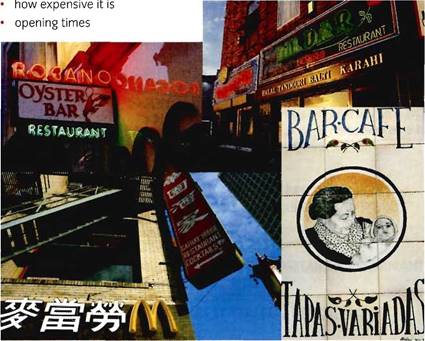 how expensive it is
how expensive it is
17 CAFES & RESTAURANTS
![]()
SATURDAY & SUNDAY
![]()
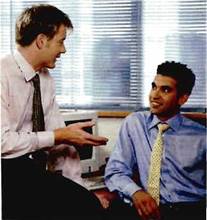
Which verb has two past forms? Can you find examples in Tapescript 18.1 on p. 109?
What do you know?
1 Look at the dialogue. What is wrong with the verbs in blue? Correct them.
A How was your weekend?
![]()
B Great! I have a fantastic time. On
Saturday morning I play tennis, then I ![]() to the cinema with Angela in the
evening.
to the cinema with Angela in the
evening.
|
A |
What do you see? |
|
B |
Point Blank. I think it is great. we meet Rachel in the pub afterwards. What about yours? |
|
A |
Not bad. Alison comes around. I make dinner for her. She cooks for me last week. |
|
lesson Past simple irregular and regular Pronunciation of -ed • Talking about your weekend |
2
![]()
![]()
Against the clock 3 minutes In pairs. Which verbs in exercise 1 are irregular?
Make a list and add any others you know.
3 Can you complete this rule for regular verbs?
In the past simple all regular verbs
end in the letters![]()
1 Listen to a conversation between Bruce and Vic about the weekend, and read the Tapescript on p. 109. Circle all the irregular verbs. How many are from your list? Are there any new ones?
2 Now just listen. Stop the recording when you hear a negative or a question, and write it down. There are five questions and three negatives.
3 What can you remember? Are these sentences true (V) or false (X)?
1 Vic saw a film2 He loved it.
3 His girlfriend, Sarah, thought it was good, too4 They went dancing.
5 He gave Alison a birthday present.
6 Vic phoned Bruce.
7 Bruce had dinner with Karen.
8 She cooked.
9 They both enjoyed the dinner.
negative ![]() didn't
he / she / it see .
didn't
he / she / it see . ![]() we want
we want ![]() you
they
you
they
infinitive
question Did go![]() Yes, did
Yes, did
![]() he / she / it see ? No,
he / she / it see ? No, ![]() want
.
want
. ![]() you they
you they
![]()
|
Remember how to score tennis: 15 0 15 love 15-15 15 all 30-30 30 all 40—40 deuce 40-50, etc advantage |
1 ![]() In
pairs, A and B. Play a game of 'Grammar Tennis'.
In
pairs, A and B. Play a game of 'Grammar Tennis'.
A Say an irregular verb in the infinitive.
B Say the past simple and score a point. Say another irregular verb in the infinitive.
A Say the past simple and score a point.
![]() and so on. Who wins?
and so on. Who wins?
2 In groups of four. Pair A take Part 1 of the dialogue between Kat-el and Sarah. Pair B take Part 2.
|
|
1 Complete their conversation with the missing past simple verbs.
2 Swap conversations and check each other's work.
Part 1
![]()
![]() Karen
Karen
Sarah
Karen you 17s Alison?
![]() Sarah Yeah, we 18
m her in the pub, and she 19 g Vic
a CD for birthday, so he 20 w very pleased! Pity you 21
w 't there ..
Sarah Yeah, we 18
m her in the pub, and she 19 g Vic
a CD for birthday, so he 20 w very pleased! Pity you 21
w 't there ..
Karen You can say that again .

|
We can use the past simple with last and ago. last week / last month five minutes ago / two days ago Add another example of each.
|
![]()
Vary your questions:
And?
What else?
Is that all?
![]()
Can you remember
• the past simple of ten irregular verbs
• how to pronounce wanted, opened, and worked
• how to use last and ago
Practice p.96
3 Listen and check your ideas.
4 Listen to these three regular verbs. How do you pronounce -ed?
Repeat the verbs.
![]()
1 2 3
![]()
opened finished started
![]()
5 Say these verbs and put them into the three groups.
![]()
stopped decided needed wanted worked showed lived travelled
6 Complete these sentences with last ... or ... ago.
/ went to the dentist a month ago.
1
I went to the
dentist ![]() 2 I went clothes shopping
2 I went clothes shopping ![]() 3 I went out for dinner .
3 I went out for dinner .![]()
4
I started
learning English![]()
5
There was an
election in my country![]()
6
I bought a new CD
![]() speak out
speak out
1 Against the clock 2 x 2 minutes In
pairs. Ask each other about the weekend agai n and again and agam![]()
Take notes as you listen. Who can think of the most answers?
Remember to count.
A What did you do at the weekend?
B I went fora walk. (7) A And?
B I went to the theatre. (2) A What else?
B I brushed my teeth. (3)
2 Choose things your partner did which interest you. Ask as many questions as you can about them. You said you went to the theatre.
When did you go?
What did you see?
Did you like it?
Who did you go with? ![]()
18 SATURDAY & SUNDAY
1
![]()
![]() Label this world map.
Label this world map.
![]()
|
South America the Far East the Middle East south-east Asia |
Europe Australasia Africa |
Central America Asia North America |
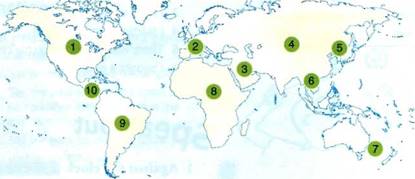
2 In groups. Can you think of one country in each region? Make a list of the countries on the board.
South America Venezuela
|
we say the with plural countries: the United States (of America) the Philippines theðetherlands We alsp say the UK. |
3 Which regions or countries would you like to go to? Why?
One
day, I'd like to go to![]() because
because![]()
EXPAN D your vocabulary
What languages are spoken in the countries you have listed?
What do you call a person who lives there? Brazil - Portuguese - a Brazilian
|
lance cl = clean |
tho h |
|
abefutilu bea |
formaboctel comf |
|
drocwed cro
|
sinoy
no_ |
|
depullot
pol |
nusny sU__ |
|
nereg gr |
pexsineve exp____ |
|
yiturots
to |
talf fl |
1
![]()
![]()
![]()
![]()
![]()
![]()
![]()
![]()
![]() What are
these adjectives? There are some letters to help you.
What are
these adjectives? There are some letters to help you.
|
|
cheap cloudy |
uncomfortable mountainous |
cold |
2
![]() Look at exercise 1 and find the opposites of these
adjectives.
Look at exercise 1 and find the opposites of these
adjectives.
3 For each adjective in exercise 1 think of something it can describe. clean streets beautiful countryside
4 Look at these photos of Lucys holiday. Where do you think she went?
5
Listen to Lucy talking about her holiday. Tick (V) the adjectives
 she uses from exercise 1. What do they
describe?
she uses from exercise 1. What do they
describe?
New Zealand was much ![]() than Australia. The countryside is a
lot
than Australia. The countryside is a
lot ![]() and
and ![]() Unfortunately it's a lot
Unfortunately it's a lot ![]() too, but we thought it was
too, but we thought it was
![]()
|
Comparatives |
polluted, cloudy, green, hot, and crowded. What big 1
clean
2
beautiful 3+ |
|
Follow the flow chart with are the comparatives? How many |
|
When we want to know about something, we can ask: Present What is / are like? Past What was / were like? |
2 Can you remember these two questions Jan asks about Australia? Check in Tapescript 19.1 on p.109.
Jan ![]()
Lucy Absolutely fantastic.
Jan ![]()
Lucy Sunny every day!
19 TOWN & COUNTRY
1 Make questions about a holiday, and match them to the answers.
|
1 What |
flight |
like |
? |
|
2 What |
hotel |
like |
? |
|
3 |
food |
|
|
|
4 |
beaches |
|
|
|
5 |
people |
|
|
[2 Really comfortable. The bed was enormous.
[2 Very tasty. Lots of fresh fruit, too.
[2 Very friendly and helpful.
[2 Clean, quiet, and beautiful, and the sea was warm! [D It was fine, only two hours.
2 In pairs. Ask and answer the questions. This time give negative answers.
A What was the flight like?
B Terrible. It was ten hours, and the films were awful.
|
Three comparatives are irregular: good — better ba —worse far—further |
3 Order the words in these sentences comparing different parts of the world, and punctuate them.
1 worse in Britain weather than in is Spain the
2 the the is than Atlantic Pacific larger
3 more you or interesting think is which Tokyo Seoul do ?
4 Town more is expensive in York than Cape shopping New in
5 Belgium than in is Greece in it sunnier
1 In pairs. Make a dictionary of adjectives to describe places. Write these letters on a piece of paper.
![]()
s
h
![]()
Can you remember ...? 2 Close your books and try to write adjectives for each letter.
• six regions of the world 3 Think of two countries or cities that you know.
• three words which mean
1 In pairs, A and B. very good
A Compare the places using as many adjectives as you can.
• three irregular comparatives
B Listen and tick (V) the adjectives
when you hear them![]()
Practice p.98
2 Change roles.
60 1 TOWN & COUNTRY
1 Last month Jonty went on holiday. Look at the words in blue.
What do they mean? Use a dictionary or ask if you don't know.
![]() He went through passport control.
He went through passport control.
The plane landed and he got off.
He packed three suitcases![]()
He checked in and got his boarding pass.
He booked his flight on the Internet.
|
In this lesson |
|
• Airport and in-flight vocabulary Understanding travel adverts • Booking a flight |
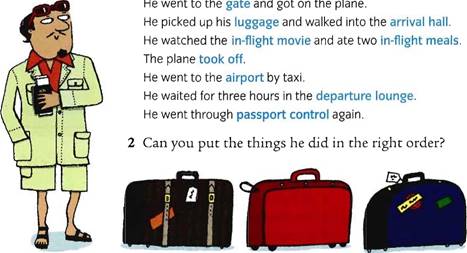 He went to the gate and got on the plane.
He went to the gate and got on the plane.
3 In pairs. Think about the last time you flew. Which of the things in exercise 1 did you do?
My last trip was to Argentina. I didn't book my flight on the Internet — I went to a travel agent.
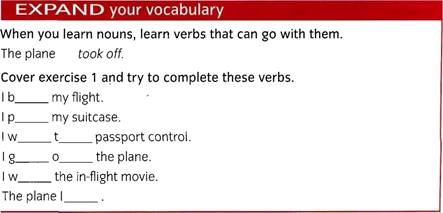
Booking by phone
1 ![]() Look
at this advert for flights. Which place would you go to? Wh
Look
at this advert for flights. Which place would you go to? Wh ![]() I'd go to
Reykjavik. I'd like to see the midnight sun.
I'd go to
Reykjavik. I'd like to see the midnight sun.
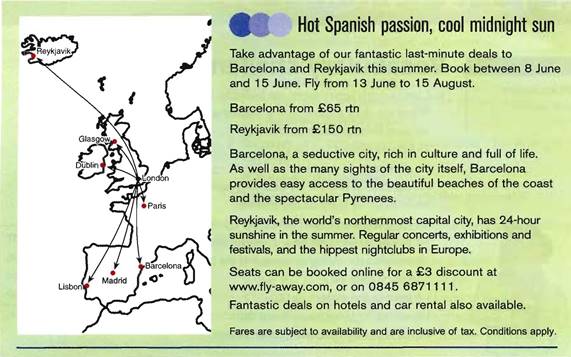
2 Read the advert again. Are these sentences true (V) or false (X)?
1 Booking online is more expensive.
2 All flights to Barcelona are Ê65.
3 Barcelona is a quiet city.
4 It doesn't get dark in Reykjavik in the summer.
5 Reykjavik is a good place for younger people.
6 You can also hire a vehicle if you want. 7 This advert is for online booking only.
3 Complete the answers to these questions. Use the words in the bc
![]() I to book 06 B
I'd like
I to book 06 B
I'd like ![]() a flight, please.
a flight, please.
in the morning myself / me A How can I help you?
1 1 Greendykes Road credit card ![]() 2 A When do you want to
travel?
2 A When do you want to
travel?
![]()
Charlbury possible ![]() B
15 July, if
B
15 July, if
![]()
3QQ ![]() 3 A How many people are
travelling?
3 A How many people are
travelling?
B Just
![]()
4 A What time do you want to travel?
B Sometime
![]()
5 A How would you like to pay?
B By![]() please. 6 A What's the expiry date?
please. 6 A What's the expiry date?
![]()
7 A Could you confirm your address and postcode, please?
B Yes, it's
![]()
20 TICKETS & FLIGHTS
|
Can you say the dates in the table correctly? Check on p.05. |
4 Listen to the first part of a conversation booking a ticket by phone. Correct any mistakes in the table.
![]()
where? New York
![]()
![]()
date / leave? 13 June
|
Travel times often use the 24-hour clock. 0900 = oh nine hundred
0920 = oh nine twenty 1800 = eighteen hundred 1845 = eighteen forty-five |
|
time / leave? |
10.50 |
|
price |
|
![]() date / come back? 1
July
date / come back? 1
July
time / come back? 15.50
5 Now listen to the second part. Can you complete the booking form?
|
|
|||||||||
|
Edinburgh |
|||||||||
|
Postcode |
|
||||||||
6 In pairs. Compare your answers. Do you agree? speak out
1 In pairs, A and B. Act out a telephone booking. Use language from this lesson.
A is the customer who wants to make a booking. Look at the advert on p.62 and decide:
![]() where
you want to go
where
you want to go ![]() when you want to go / come back
when you want to go / come back
![]() how
many people are travelling
how
many people are travelling
![]() your
credit card number and expiry date
your
credit card number and expiry date ![]() your
address
your
address
B is the travel agent. Think about the questions you need to ask.
![]()
![]() where the customer wants to go
where the customer wants to go ![]() when
they want to travel and return
when
they want to travel and return ![]() the number of passengers
the number of passengers ![]() how
the customer wants to pay
how
the customer wants to pay ![]() the customer's name and address
the customer's name and address ![]() any
other details, e.g. credit card number
any
other details, e.g. credit card number
2 Take two minutes to think about the phone call you are going to have. 3 Sit back to back and make your phone call.
20 TICKETS & FLIGHTS
1 When
you're on holiday, do you normally .![]()
|
21 |
|
& |
DOUBLES |
|
SINGLES
|
|
In this lesson |
|
• Understanding accommodation guides • Booking a hotel room |
![]() stay in hotels
stay in hotels ![]() book
a self-catering apartment
book
a self-catering apartment 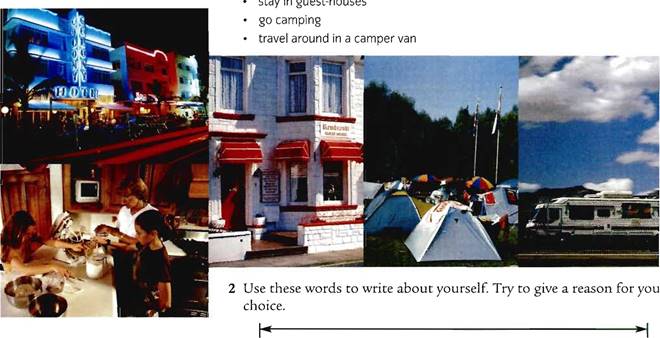 stay in guest-houses
stay in guest-houses
always usually sometimes hardly ever neve
I always stay in a hotel. I don't like making the bed when I'm on holiday. I never go camping. It's very uncomfortable.
3 In groups. Talk about yourself. Where do most people in your grou stay when they're on holiday?
![]() Understanding
accommodation guides :g 1 Look at these symbols from a guide to
guest-houses. Match each symbol with a description. Use a dictionary to help
you.
Understanding
accommodation guides :g 1 Look at these symbols from a guide to
guest-houses. Match each symbol with a description. Use a dictionary to help
you.
![]()
![]()
![]() credit
cards acceptedrooms with television packed lunchesCentral heating tea / coffee
facilitiespets welcome number of en suite roomsno smoking
credit
cards acceptedrooms with television packed lunchesCentral heating tea / coffee
facilitiespets welcome number of en suite roomsno smoking
2 In pairs. Cover the descriptions. Point to the symbols and test each other.
A What does this symbol mean?
B It means that you can make tea or coffee in your room.
3 Read these advertisements for guest-houses in Ireland. Which do you think is more attractive? Write two or three reasons for your choice.
![]() I prefer because
I prefer because
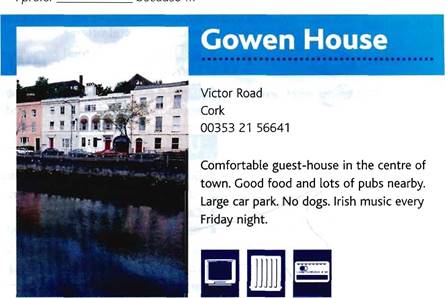
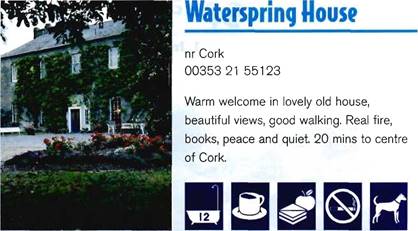
4 In groups. Tell each other your choice. Do you agree?
1 David and Marta are trying to book a room at a hotel in New York. First they phone the Excelsior. Listen and complete the gaps.
1 They want a room for![]() and
and ![]()
2 They want a ![]() room with
room with ![]()
3 The room costs ![]()
4 The price includes ![]()
2 Here are some sentences from the dialogue. Reorder the words and decide who says them, David or the receptionist. Listen again to check your ideas.
1 1'd book a like room for this Saturday Friday and to
2 breakfast a free we $225 double with have at
3 phone back I confirm to can later ?
|
a twin room a single room |
3
![]() now try another hotel. What are the three differences in what this hotel
offers?
now try another hotel. What are the three differences in what this hotel
offers?
4 Listen to the final conversation. Which room do David and Marta take? Why do you think so?
5 In pairs. Look at and listen to the useful language for booking room. Which words are stressed? Practise the sentences.
|
Useful language |
|
1 Do you have any rooms free for tomorrow night?
2 I'd like to book a double room for Friday and Saturday.
3 Can I phone back later to confirm?
4 How much is a single / double / twin?
5 Is that with breakfast?
6 I'd like to confirm a booking, please.
![]()
1 In pairs, A and B.
A You want to book a hotel in Cape Town, South Africa. Look at p. 105.
B You run a hotel in Cape Town. Look at p. 106.
|
Can you remember ...? • four places you can stay on holiday • five things that a good hotel / guest-house has three questions to ask when you book accommodation Practice p. 100 |
|
|
|
|
2 ![]() A phone B and try to book a room. Ask
about the facilities the hote offers. Then change pairs and phone another
hotel.
A phone B and try to book a room. Ask
about the facilities the hote offers. Then change pairs and phone another
hotel.
3 A decide which hotel you prefer and phone back to confirm your reservation.
What do you know?
1 Against the clock minute In pairs. How many money words do you know? Put them in this chart.
verbs nouns adjectives people
![]()
to buy a bank rich a robber credit cards
![]()
2 Make a class list of words on the board.
3 In groups. Choose one of the words. Write a sentence with the word, but leave a space where the word should go.
![]() £10 on the lottery last
Saturday.
£10 on the lottery last
Saturday.
4 Pass your sentence around the class. Can the others guess the missing word?
|
In this lesson |
|
• Money vocabulary • Present perfect and past simple • Talking about experiences |
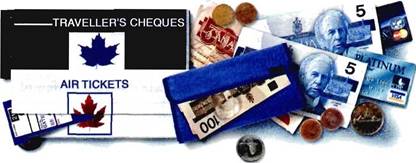
1 Alex is going to Canada, and wants to know the best way to take money. Listen. What advice does Mark give her?
|
What's the best way for travellers to carry money in your country? |
• Take traveller's cheques. Take credit cards and cash. C]
• Take cash. • Take credit cards.
2 Listen again and tick (V) these phrases when you hear them.
![]()
I've
![]()
I haven't
![]()
3 In pairs. Compare your Vs. Which phrase did you hear twice?
4 Look at Tapescript 22.1 on p.110. Write down the words that follow the phrases in exercise 2.
Have you ever ... been to Canada?
All these sentences are in the present perfect tense. 5 Complete this
sentence from the listening. ![]() my wallet on a table in a restaurant
my wallet on a table in a restaurant![]()
What tense is this?
Present perfect
![]() 've past participle Haveyou 7 Yes,
've past participle Haveyou 7 Yes, ![]() have. you
have. you
haven't regular No, ![]() haven't.
haven't.
same as past simple irregular see p.
11 1 he 's Has she![]() Yes, has she hasn't No,__
hasn't
Yes, has she hasn't No,__
hasn't ![]() it
it
We can use the present perfect to start a conversation about our past.
Have you ever been to Canada?
We give details of the past in the past simple.
Yes, just once. I went there two years ago.
![]()
1 Look at this conversation. What are the three forms of the verb?
|
How many times? Ix once twice three times four times a couple of times a few times |
A
![]()
![]()
![]()
![]()
![]()
![]() Have you ever won any money?
Have you ever won any money?
B Yes, once.
A How much did you win?
B £25. I won it on the lottery.
2 Complete the chart of money verbs.
infinitive past simple past participle
win won
![]()
borrow borrowed
![]()
lend lent
![]()
found found
![]()
lose lost
![]()
![]() gave
gave ![]() buy
buy
![]()
3 In pairs, A and B. Test each other.
A
Say the present perfect
question and the past simple question ![]() B Say the past simple form.
B Say the past simple form.
A Have you ever won? — did you win?
B won
22 WHEN & WHERE
4 In pairs. Look at this questionnaire and interview each other.
![]()
I Have you ever lost your credit card?
2 Have you ever found any money?
3 Have you ever given money to a charity?
4 Have you ever won any money?
5 Have you ever bought something you didn't need?
![]()
Can you remember ...? ![]() six money verbs
six money verbs
• three ways to take money when you A Have you ever lost your credit card? travel
B No, never/ Yes, once.
• when to use Have you ever ... ?
A Really? When was that?
Practice p. 101
B
I lost it in Germany. I
was on business .![]()
1 Write ten present perfect questions to ask your partner. You can use some of these verbs if you want.
![]()
![]() Have you ever been white-water
rafting?
Have you ever been white-water
rafting?
Write five questions that you think your partner will answer 'No' to. Write five questions that you think your partner will answer 'Yes' to. Don't show each other your questions.
2 In pairs. Ask each other your
questions. If your partner answers 'yes' ![]() ask more questions and find out as
much as you can.
ask more questions and find out as
much as you can.
A Have you ever been white-water rafting?
B Yes, once.
A Really? When?
B A couple of years ago. A How was it?
B Brilliant.
We went to .![]()
3 Did your partner give the answers you expected?
22 WHEN & WHERE
1 In pairs. Describe a shop you like. Use these questions to help you.
![]() Where is it?
Where is it?
![]() What kind of shop
is it?
What kind of shop
is it?
|
|
|
Shop vocabulary Shop dialogues Saying what things are for |
![]()
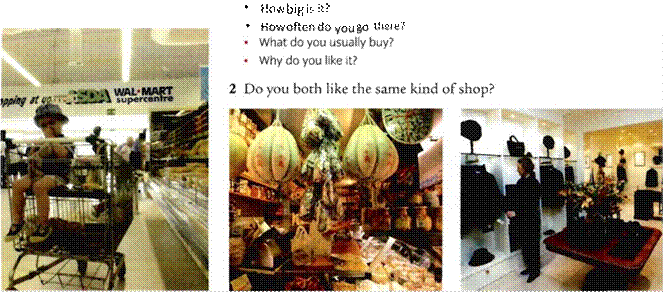
1 In pairs. Listen - where is each conversation? Try to solve the puzzle.
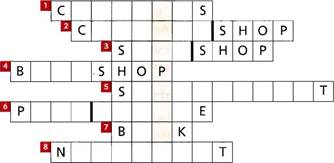
2 Look at Tapescript 23.1 on 12.110. Change the words in bold and practise the dialogues.
What's it for?
1 Against the clock minuteq Make sentences and match them to the pictures. Check with a partner. They're for cutting paper. picture f
They're for cutting They're for listening to messages
music coffee They're for locking It's for paying for calls
It's for looking up
information postcards They're for sending
It's for making appointments
It's for remembering new words paper It's for making It's for taking the door
It's for storing pictures It's for taking the shopping
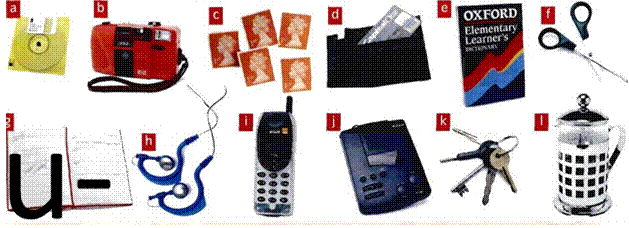
|
Scissors are plural and take a plural verb. These scissors are sharp. Can you think of any other words that are always plural? |
2 In pairs. What are the things in the pictures called? Which pair can get the most? Check your answers in class.
3 Test each other.
|
EXPAND your vocabulary Try labelling things, e.g. This works very well for things in the house. When you know the word, throw the label away. |
|
![]() A They're for cutting paper. B
Scissors.
A They're for cutting paper. B
Scissors.
|
23 SHOPS & SHOPPING |
4 Look at these phrases. Put the words in the right order. Then listen and check.
1 you I ? can help
2 camera you do ? mean a
3 it ? called what's
4 looking for what you ? are
5 in word I the don't English know
6 please you I if wonder could me help
7 it yes that's
8 in called I it's don't what English know
5 Now complete these shop dialogues with the phrases from exercise
1 ![]()
![]() Assistant
Assistant ![]()
Customer
Yes, I'm looking for something, but![]() It's for putting photographs in.
It's for putting photographs in.
Assistant Oh, a photo frame.
Customer ![]()
2 Customer Hello.
Assistant Of
course. ![]()
![]() Customer That's
the problem —
Customer That's
the problem — ![]() It's for taking photograpl
It's for taking photograpl
Assistant ![]()
Customer No,
the thing in the camera. ![]()
Assistant Oh, the film.
Customer Yes, that's it.
6 Listen and check. Look at Tapescript 23.3 on p. 110 and practise the dialogues. speak out
In pairs. Look at the pictures on p. 71 again. Choose one or more thin you would like to buy and practise similar dialogues to the ones in
Can you remember
exercise 5. Act out your dialogues to another pair.
• six names of shops how to ask for things when you don't know the word in English
Practice p. 102

|
In this lesson Clothes vocabulary Clothing categories Going clothes shopping |
1 Against the clock (h minute4ì In pairs. A Write down as many clothes as you can.
B Write down as many colours as you can.
2 Compare your lists. How many more words can you add?
3 Think about your most recent weekend away. What clothes did you take?
I took
my black jumper, and a couple of T-shirts, one white, one blue![]()
1 Match these clothes and accessories with the pictures.
|
Can you think of two other clothes with suit? t suit s suit |
![]()
![]()
![]() a
jumper a suit walking boots gloves
a
jumper a suit walking boots gloves ![]() a briefcase cargo
pants trainers a waterproof jacket a fleece a backpack a bag a
cap
a briefcase cargo
pants trainers a waterproof jacket a fleece a backpack a bag a
cap
|
We can use pair of with 'plural clothes'. I've got some jeans / two pairs of jeans. Can you think of more plural clothes? |
2 Find a person in che class for each of the items. Write their name beside the item.
A Have you got a waterproofjacket?
B Yes, I have. Have you got a pair of walking boots? A No, I haven't. Have you?
3 Look at this page from an Internet shopping site. Which words would you click if you want the things in exercise 1?

4
![]() Listen to these five people. What clothes and accessories
are they talking about? Choose from exercise 1.
Listen to these five people. What clothes and accessories
are they talking about? Choose from exercise 1.
1 In a clothes shop, who would say these things - the customer (C), the customer's friend (F), or a shop assistant (A)?
1 ![]()
![]() It looks great / nice / good.
It looks great / nice / good.
2 Any good?
3 Just looking, thanks.
4 Are you all right there?
5 Yeah, I'll take this one, please.
6 It doesn't really suit you.
7 Can I help you?
8 Yes, have you got these in a large?
9 What do you think?
2 Complete the dialogues under the pictures with phrases from exercise 1.
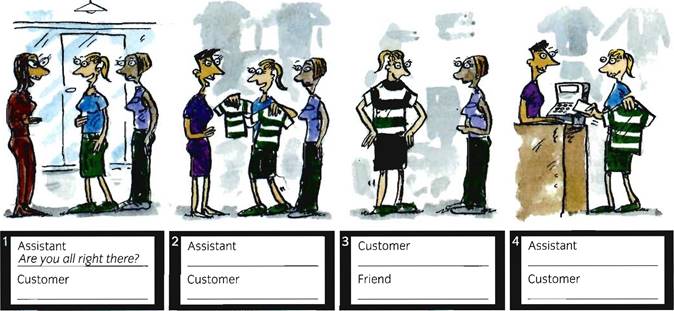
3 Listen and check your answers.
4 In pairs. Listen again and practise the dialogues together.
5 Match all the sentences that mean the same thing. It looks really nice. Can I help you?This one will be fine.
![]() What
do you think? Any good?
What
do you think? Any good?
It looks great.I'd like this one, please. I'll take this one, please. How does it look?
Do you need any help? Are you all right?
6 Change partners. Close your books and practise the dialogues in exercise 4 again. Try to use as many different phrases as you can. speak out
1 Write five questions about clothes and shopping for
clothes. Use one or more of the words below in each question. What do
you like wearing in the evenings? ![]() favourite wear expensive
favourite wear expensive ![]()
![]() Can you remember ...? where?
Can you remember ...? where?
• four things you wear when it's work evenings colour
• three things you pack for a shopping comfortable money What?
weekend away three things you say in a clothes 2 Answer your own questions on a piece of paper. shop
Practice p. 703 3 Ask other students your questions. Whose answers are the most similar to yours?
24 SUITS & BOOTS 75
The alphabet 1 Which month has the most letters?
1 Put these words into alphabetical order, as in a 2 Which month has the fewest letters? dictionary. Look up any words you don't understand. 3 How many months end in -ember?
bake use run watch 4 Which month sometimes has 29 days? How often?
2 hot cold cool cloudy windy 5 How many months begin with J?
3 question quick queue quiet quite 6 Which month do you like most? Why?
4 stand stamp start star stadium 7 When is Christmas Day / Valentine's Day / New Year's Day: 5 green grey Greek great greedy 8 What's the date today?
9 What's the date a week tomorrow?
4 Answer these questions.
Names and spelling 10 What was the date last Friday?
2 Write the complete questions.
A ![]() What I first name?
What I first name?
B Anna. 4 China ? code for what's the
A
B Harrap. 7 Now match the questions above with these answers.
A
B ![]() I-I-A-R-R-A-P. c VAOI
98.
I-I-A-R-R-A-P. c VAOI
98.
![]() 3 Are these first names for men (M)
or women (W)?Hold on it's OO 86
3 Are these first names for men (M)
or women (W)?Hold on it's OO 86
If you don't know, guess.120 kph, but a lot of people drive faster.
It's over 40 0 last week.
![]()
![]() BeckySeanbeen very hot,
BeckySeanbeen very hot,
LiamRussell
SharonGreg
Ruthpenny
DuncanHeather
Form filling
8 Fill in these details for a credit card application.
![]()
![]()
![]() Mrs Miss , Ms Other
title
Mrs Miss , Ms Other
title ![]()
Surname
![]()
First name(s) ![]()
Date of birth ![]()
![]() Your home
Your home ![]()
House /
Flat number ![]()
Street
![]()
City![]()
Postcode
-![]()
Time at present address
![]() years
years ![]() months
months
Home telephone number
(with code)![]()
Are you (tick the box)
a home owner a tenant living with parents L
Are you (tick the box) employed selfæmployed retired a student unemployed
Occupation![]()
Business telephone number (with code)
Additional information
Please include your e-mail address if you have one
Countries and nationalities
1 Complete these countries.
1
2 apa
3many
den
2 Now complete the table of nationalities with the countries from exercise 1.
![]()
Spanish Japanese
![]()
3 Complete these questions and find the answers.
1 ![]() James yesterday?
James yesterday?
2 Whothat woman over there?
![]()
3 ![]() John and Alice at school? 4
John and Alice at school? 4 ![]() you from the States?
you from the States?
5
What ![]() his job?
his job?
6 WhereKaren?
![]()
7
![]() Sam coming to the cinema? 8 HOW
Sam coming to the cinema? 8 HOW![]() your parents?
your parents?
9![]() you on holiday last week?
you on holiday last week?
10 ![]()
![]() She's on holiday.
She's on holiday.
She's the new personnel manager.
He's an accountant.
No, they're visiting their grandparents.
He was in London.
Only five minutes.
No, he isn't, he's busy this evening.
They're fine.
No, I was off sick.
No, I'm Canadian.
4 Put the words in the right order to make questions. Then find the answers in the two e-mails on 19.08.
1 Marzia is from where ?
A Where is Marzia from?
B She's from Parma, in Italy 2 her what job is ?
3 like her is pay what ?
4was where last Jim year ?
|
9 12 the Nlands |
5 with who he was ?
6 was what the like weather ?
![]()
![]()
7 what the was like food ?
![]()
![]()
8
before when they there![]()
![]()
![]()
Pronouns
5 Complete these answers.
![]() Are the Andes in Africa?
Are the Andes in Africa?
B No, they aren't, they're in South America.
![]() Is Nairobi the capital of South
Africa? B No
Is Nairobi the capital of South
Africa? B No![]() Kenya.
Kenya.
![]()
![]() Was John Lennon one of the Rolling
Stones? B No
Was John Lennon one of the Rolling
Stones? B No![]() Beatles.
Beatles. ![]() Was Mozart German? B NoAustrian.
Was Mozart German? B NoAustrian. ![]() Are whales fish?
Are whales fish?
B No, ![]() mammals.
mammals.
![]() Were Sally and Andrea in Hungary last
week? B No
Were Sally and Andrea in Hungary last
week? B No ![]() Poland.
Poland.
![]() I think her name's Stephanie. B No
I think her name's Stephanie. B No ![]() Elizabeth.
Elizabeth.
![]() You're from the States, aren't you?
You're from the States, aren't you?
![]()
6 Complete the spaces with pronouns.
1 The weather was foggy yesterday.
![]() It
It
2 My wife was in hospital last month.
3 The house is for sale.
4 John's parents were here yesterday.
5 Mr Klein is a businessman.
6 My friends and I are going shopping.
Relationships vocabulary
1 Look at the family tree. What relation are these peopto Helen?
|
Mark Michael Holly Maria Jane Stanley Justin Bernie John Janet Harry Sally |
husband
|
John ![]() Jane
Jane
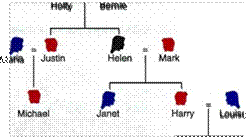
Stanley saw
2 Read what Helen says about her family. Underline the mistakes and correct them.
1 1've got two brothers. I've got one brother.
2 My grandfather's name is Jack.
3 1've got three children.
4 My daughter has two children.
5 1've got two nephews.
6 My sister-in-law is called Caroline.
|
8 Harry's sister is called Jane.
|
7 Stanley is my granddaughter.
3 Complete these sentences with the correct form of have got or has got.
1 She 's got![]() fair hair.
fair hair.
2 They![]() two children.
two children.
3 I can't come. I![]() a ticket.
a ticket.
4 A Where's the TV guide?
B I think Ben ![]() it upstairs.
it upstairs.
5 Can I borrow a fiver? I![]() any money.
any money.
6 I love Edinburgh. It![]() just about everything you need.
just about everything you need.
7 Mary ![]() a toothache.
a toothache.
8 Mr and Mrs Davies ![]() a new Mercedes. 9 The bookshop across
the road
a new Mercedes. 9 The bookshop across
the road![]() the best selection of books I know.
the best selection of books I know.
![]() a car. He can't afford it
a car. He can't afford it![]()
4 Write the questions. Then answer them yourself.
1 any change
A Have you got any change? B Yes, I have / No, I haven't.
2 any brothers and sisters
![]()
![]()
3 a mobile
![]()
![]()
4 any plans for the weekend
![]()
![]()
5
![]()
![]()
6 a big family
5 Complete the description of a flat with the words in the box.
reading balcony living room bedrooms building watching floor dining room
![]() We live in a flat in the centre of Bristol. It's in a big
We live in a flat in the centre of Bristol. It's in a big
![]() on the top 2 There's a big
3
on the top 2 There's a big
3
![]()
![]() where we spend most of our time, TV
or 5 by the fire. There isn't a
where we spend most of our time, TV
or 5 by the fire. There isn't a
![]()
6 — we eat at a table in the kitchen
![]() though one of
though one of
![]() them is very small, and a little 8
them is very small, and a little 8 ![]() with a view over the park. We
haven't got a garden, but that's OK, we don't like gardening anyway!
with a view over the park. We
haven't got a garden, but that's OK, we don't like gardening anyway!
6 Write these things in the correct room.
soap dishwasher coffee table wardrobe hi-fi pillow towels pots and pans toilet paper duvet bookcase washing-up liquid
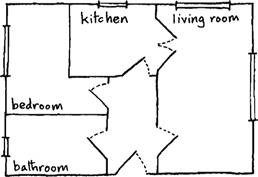
Read the texts. Where do the people live? There are two texts for each place.
![]() a
house in the suburbs a fiat in the city centre 1 1 a
house in a small village
a
house in the suburbs a fiat in the city centre 1 1 a
house in a small village ![]()
|
|
2 |
All the houses look the same |
3 The worst thing is doing the |
|
that's enough for me. It can be very |
|
round here, but they're quite nice, |
shopping, because there isn't |
|
noisy at night, but it's great being |
|
with three bedrooms. We've got a |
a shop here. |
|
so near cinemas and restaurants. |
|
small garden, too. |
|
|
4 It's the best of both worlds - it's |
5 |
I'm on the top floor, but |
6 1 don't see my friends as often |
|
easy to get to the city centre, and |
|
there's a lift. The view over |
as I'd like to, but they sometimes |
|
easy to get out into the country. |
|
the rooftops is great. |
come to stay for the weekend, and we go for walks. |
![]()
Test your spelling lessons 01—03
Look at Helen's family tree in exercise 1. Draw one for correct the mistakes in these words?
Can you yourself, and write a description of your own family.
Include
as many different relations as possible. daugter ![]() favourjt
sirname
favourjt
sirname ![]() fourty
fourty ![]() terible businesman
terible businesman
|
|
|
![]()
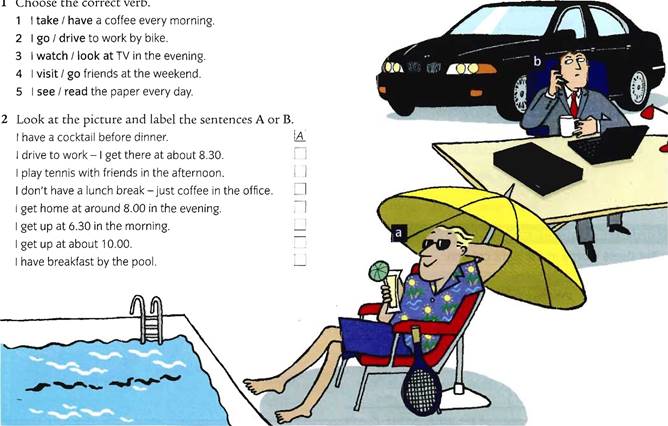 1 Choose the correct verb.
1 Choose the correct verb.
3
Now put the
sentences for the two men in the right 6 order. 7 ![]() 8
8
9 I get up at 6.30 in the morning.
![]() 10
10
![]()
The weather in Britain from day to day.
Most snakes away if they hear you coming. ![]() a
lot of people in his job.
a
lot of people in his job.
My father 20 a day.
You in the city, don't you?
6
![]()
![]()
4 Write down two things you do for each topic.
Work I work in a hospital.
I start at half past seven every morning.
![]()
Work
![]()
Free time
![]()
Food / Meals
7
![]()
Entertainment
![]()
Shopping
![]()
Clothes
Make sentences with a negative.
1 Simon speaks French / Russian
Simon speaks French but he doesn't speak Russian.
2 My mother drinks tea / coffee
3
4 They watch videos / go to the cinema
![]()
5 I have toast for breakfast / cereal
![]()
Now ask questions for these answers.
![]() A What languages does Simon speak?
A What languages does Simon speak?
B French, German, and Spanish.
2![]()
B Eight cups a day.
3![]()
B From Monday to Saturday.
4![]()
B No, they watch videos.
![]() 5
5![]()
B Toast and marmalade.
![]()
Holidays every
8 Write six sentences about your life with these phrases.
![]() I listen to the news on
the radio every morning.
I listen to the news on
the radio every morning.
5 Complete the sentences with the correct form of these every week verbs. every day
|
|
move drink speak |
smoke have |
|
every couple of years
every Sunday
1 Simon sp eaks French,
German, and a little Spanish. 2 My mother ![]() eight
cups of tea a day. 3 The National Museum from Monday to Saturday,
eight
cups of tea a day. 3 The National Museum from Monday to Saturday,
4
They
![]() a lot of videos.
a lot of videos.
5 toast and marmalade for breakfast. Delicious!
9 Look at the airline timetable and answer the questions.
A What time is the first flight from London?
B 06.55.
1 What time does the five past eight morning flight from London arrive in Berlin?
2 What is the flight number of the four o'clock afternoon flight from Berlin?
3 How many morning flights are there from London? 4 What time is the last flight from Berlin?
![]()
5 Which flight must you catch if you want to arrive in London before nine in the evening, but cannot leave Berlin until after six?
6 Which days is there a London—Berlin flight at quarter to one?

depart arrive
|
06:55 |
09:45 |
MTWThF |
BA970 |
|
08:05 |
10:50 |
sasu |
BA972 |
|
12:45 |
15:35 |
MWF |
BA966 |
|
16:00 |
18.40 |
TThSa |
BA964 |
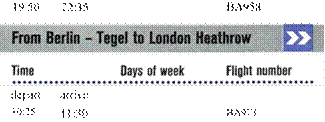 MTWThF
MTWThF|
|
12:30 |
sasu |
BA973 |
|
1600 |
17:05 |
MWF |
BA967 |
|
19:05 |
20:10 |
TThSa |
BA965 |
|
23:30 |
00:40 |
|
BA959 |
1 Read part of a letter from Jeremy to a friend. Are the sentences true (V) or false (X)?
![]() Sendi/7ey a pho+o Of Jill and me on
ho/iclay in (treeoe +1,1iS year. She's Fine SenUS her love.
Sendi/7ey a pho+o Of Jill and me on
ho/iclay in (treeoe +1,1iS year. She's Fine SenUS her love.
She'S a new feaoLait1cy Job! DO you remember
Bit/? We//, Lae +eaoLaeS SAþ1e sol-too/ Jiff goes +0 work wt+h fenera//y
Shek happy WHI„a floe Job, buf She ![]() fhe
heat/ feat-her. He pushes lats s-faÇÇ a /of, 1 fhi/lk. 4// -1
know She'S happy -fo ye+ 1-10þle. She Çtmshes 4.00 mos* Jays buf
*ha-fi s no-f -flu
fhe
heat/ feat-her. He pushes lats s-faÇÇ a /of, 1 fhi/lk. 4// -1
know She'S happy -fo ye+ 1-10þle. She Çtmshes 4.00 mos* Jays buf
*ha-fi s no-f -flu ![]() her
Clay. She s+uUies "osi evenings +00 - she s an exam tn May. Haru work!
her
Clay. She s+uUies "osi evenings +00 - she s an exam tn May. Haru work!
1
![]() Jill and Jeremy are on holiday.
Jill and Jeremy are on holiday.
2 Bill's a teacher.
3 Bill and Jill work together.
4 Jill loves everything about her job.
5 The head teacher makes his staff work hard. 6 Jill always finishes work at the same time.
2 What are these verbs? Which one isn't in the letter above?
1
shupes ![]()
2
![]() sego
sego
|
4 cheates |
t |
|
5 chatsew |
w |
3
![]()
![]() shinifes
shinifes
3 Correct the spelling mistakes in these sentences.
I Mary watchs soap operas to relax.
2 He studys in the evenings after work.
3 Ally gos to work by bus.
4 Jack finishs work before me.
5 Jackie boxs cans of Coke in a factory.
6 Dan pases our house on his way to work.
4 Read the texts about Becky and Ruth on p. 16 and p. 17. Match these question words with the answers.
![]()
 Once a year.
Once a year.
![]()
Why? A local family.
![]()
5
Now write the questions in full![]()
1 What time does Becky start work?
2![]()
3![]()
4 ![]()
![]()
5![]()
6![]()
6 Rewrite these sentences with the word in (brackets).
1 The bus is early.
(often)
The bus is often early.
2 Janice finishes work early.
(often)
![]()
3 1 just sit and do nothing.
(sometimes)
![]()
4 He watches TV.
(hardly ever)
![]()
5 Mark does the washing-up.
(never)
![]()
6 What time do you get up?
(usually)
![]()
7 We don't eat meat.
(always)
![]()
8 They're late.
(often)
![]()
7 Match the words and the symbols.
1 windy 4 cold
2 sunny 5 hot
3 rainy / wet 6 snowy


8 What's the weather like where you live? Add an adverb of frequency to these sentences. If possible say when. It's sometimes windy where I live, especially in the summer.
1 It's windy.
![]()
2 It's sunny.
![]()
3 It rains.
![]()
4 It's cold.
![]()
5 It's hot.
![]()
6 It snows.
![]()
06
1 Complete these jobs with -or or -er.
|
solicit |
act |
|
decorat |
wait |
|
farm |
plumb translat |
|
writ |
bank manag |
2 Match the jobs and the places. (Sometimes more than one answer is possible.)
|
an au pair. |
a secretary. |
|
a businesswoman |
a teacher. |
|
a computer programmer. |
a lawyer. |
|
a doctor. |
an architect. |
![]() in a children's hospital
in a children's hospital ![]() in a school near here. for a
multinational company.
in a school near here. for a
multinational company.
for a
family in America. ![]()
in a computer lab in the university. in an office in the centre of town.
3 Complete the puzzle with the person who can help with each problem (you can use a dictionary to help you). What's the word down the middle?
8 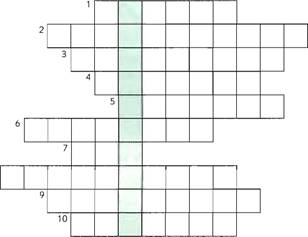
1 Jamie's not well![]()
2 We need a new light switch ![]() 3 We want to design a new house. 4 We
need someone to build it !
3 We want to design a new house. 4 We
need someone to build it !
5 There's water all over the floor.
6 My car's broken down.
7 My cat's sick.
8 We need someone to look after the kids tonight.
9 The kitchen needs painting.
10 Our son's got an awful toothache.
4 Write out the letters of the alphabet and make your own 'jobs' dictionary.
a archikcck, arkis+, aukhor b buildcr, bank manacjcr c
5 Complete this advert with the words in the box.
experience
salary skills motivated ![]() a degree details applicants essential
a degree details applicants essential
![]()
We require a fund-raising manager to help us maintain our position in the competitive world of environmental charities.
![]() should have five years'
should have five years'
![]() 2 in
a related field, and
2 in
a related field, and ![]() 3 in an earth science. Knowledge of
fund-raising is
3 in an earth science. Knowledge of
fund-raising is ![]() 4
4 ![]() Applicants should be
Applicants should be ![]() 5 and
have good
5 and
have good
communication 6
![]()
The
![]() 7 is
in the region of £25K.
7 is
in the region of £25K.
For more 8 e-mail
![]()
h.thomas@worldwatch.org.uk
Test your spelling lessons 04-06
One word in each sentence is spelt incorrectly. Can you find it and correct it?
1 1 only have coffee for brekfast![]()
2 She dosn't drive to work![]()
3 1 have a meeting with my colleages every week.
4 The temprature is sometimes very low in winter. 5 The job's boring, but the sallary is excellent.
![]()
Likes and dislikes
1 Read the advert and match the
activities to the pictures. 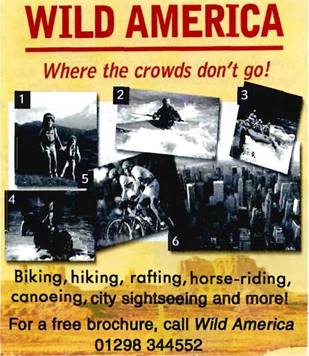 WILD AMERICA
WILD AMERICA
2 Tick (V) the activities you enjoy doing.
3 The advertisement says ... and more! Think of three other activities the travel company could offer. Use a dictionary to help you.
|
|
Reading |
|
|
|
|
and choose a or b to complete the sentences. a) eight hours a day. b) twelve hours a day. part of the job is a) the research. b) the teaching. a) never works overnight. b) occasionally works overnight. most of his time a) correcting exams. b) working in the laboratory. a) most things about his job. b) everything about his job. academics have a) an easy life. b) a difficult life. work trip abroad a) once a year. b) twice a year. a) likes what he does. b) doesn't like what he does. |
A day in the job of Graham Rowe, biologist, Exeter University
My working day doesn't usually start very early, maybe around 10.00. My job involves some teaching, but it's mainly research. If I'm teaching, I often give a couple of lectures in the morning, and then I sometimes have students' work to look at jn the afternoon, or exams to correct, which can be very time-consuming. Lunch is a sandwich, and I drink constant cups of coffee through the day. The research is what I really enjoy, and I often stay in the laboratory till 9.00 or 10.00, even overnight once in a while. I've got two post-graduate assistants, and we all work fairly long hours, including weekends. Anyone who thinks that academics have an easy life should come and work with me! The good side of it is that I get to travel for a month in the summer, usually to Kenya or Tanzania. There isn't much that I don't like about the job — there's sometimes
quite a lot of university paperwork, which can be annoying when I want to be
in the lab . |
|||
|
Read the text 1 He often works 2 His favourite 3 He 4 He spends 5 He likes 6 He thinks 7 He goes on a 8 He |
4
![]() She (really) likes
She (really) likes
She enjoysplaying / watching tennis.
She's interested in
|
|
||||
|
|
|
|||
|
|
|
Organize |
|
|
|
|
new folder new favourites new divider open favourites window |
|||
5 Compare yourself to Mary. If you don't like the same things as her, say what you like doing.
I don't like playing tennis, but I like watching it.
6 Rewrite the sentences using the verb in (brackets).
1 He goes to the gym every day.
He likes going to the gym.
2 They go to the cinema most weekends.
(enjoy)
![]()
3 Mary gardens every weekend.
(love)
![]()
4 John drives whenever he can.
![]() (love)
(love)
5 We never play computer games.
(hate)
6 George spends a lot of time with his children.
(enjoy)
7 1 never get up early.
(can't stand)
8 1
think the dentist is OK![]()
(don't mind)
7 What are the -ing forms of these verbs?
drive
take get ![]() hope
hope ![]() watch
watch ![]() cycle
cycle ![]() teach
teach ![]() study
study ![]()
08
1 Look ac the diagram and the example. How long does it take you to get to these places from your home? Put them in the correct circle and write sentences.
It takes me 20 minutes to get to the cinema by bus.
cinema museum café art gallery theatre zoo restaurant bar
2 How often do you go to the places above? I go to the cinema about once a month.
3 Tick (V) the sentences that describe you. Can you add two more?
![]() I
always go out at the weekend.
I
always go out at the weekend.
I'm a football fanatic — I go to all my team's games.
I love going to the cinema.
I can only relax when I'm with people.
I like staying in.
I enjoy museums a lot.
|
I eat out at least once a month. I really like concerts. |
71 |
|
I normally don't go out during the week. I hate zoos. |
c |
![]()
![]()
4 Think of a friend or relation. Write ten sentences about them like the ones in exercise 3.
|
2 She hates football and never goes to football matches. |
1 My best friend, Arancha, sometimes goes out at the weekend.
5 Complete the sentences with the correct prepositions.
1 What'sat the cinema this week?
![]()
2 The bus stops right the theatre.
3
![]() The restaurant'sGrindlay Street. 4 We're going out to
eat
The restaurant'sGrindlay Street. 4 We're going out to
eat ![]() that restaurant
that restaurant ![]() Saturday
evening.
Saturday
evening.
5 We're taking my parents an art gallery.
6 A How are you getting home?
![]() taxi, probably.
taxi, probably.
7 Can you book tickets phone?
8 On
Sundays you can get![]()
6 Complete these sentences from a Vienna travel guide with the words in (brackets).
1 The cinema has an film festival.
(international)
The cinema has an international film festival.
2 This restaurant has a menu.
(friendly / creative)
3 This café has the waiters in town.
( best J old-fashioned)
4 The city park accommodates an zoo.
(beautiful / excellent)
5 The standard hours for museums are 10 a.m—6 p.m. In
summer.
(opening / all)
6 Vienna has about 150, most jn the city centre.
(art galleries / of them)
7 This wine bar has music — jazz, blues on Fridays.
(live / on Mondays)
8 Club 66 is till 6.00 a.m. on Saturdays and.
(Sundays / open)
9 The theatre is very and is still the home of Austrian.
|
|
Reading |
|
|
|
|
about the Tate gallery and write the answers. http://www.tate.org.uk. free. evening. 7. |
|
|||
|
Read the text Modern art questions for 1 Where is it? It's on Bankside. 2 7887 8000. 3 It's 4 It's usually 5 10.00 in the 6 It's on level |
(glamorous / drama)
1 Find nine other places in this word square.
![]()
![]() t k u k a p
t k u k a p
![]() v b b m w o b k m d z h r s s
v b b m w o b k m d z h r s s ![]() p
b j k b e n c h n c q r a o
p
b j k b e n c h n c q r a o ![]() t h d t o d k
t h d t o d k ![]() s
k j
s
k j ![]()
g ![]() a q
a q
r u ![]() o s b m b t k m h o
o s b m b t k m h o ![]() q f
d
q f
d
u b S j t o u a k p ![]() r
k n n t x h p t p q x
r
k n n t x h p t p q x ![]() j z d m S o s
j z d m S o s ![]()
![]() t
r a
t
r a ![]() n s t
n s t ![]() t
t
![]() o n
o n
2 What are these places? Match them with the definitions.
|
1 mastidu 2 cie-krin 3 quesra 4 lalm |
s
|
|
5 trop |
p |
L, an indoor area for skating a covered shopping centre
L a place for ships, boats, and ferries ![]() an
area for games and competitions, e.g football, rugby, athletics, with seats for
spectators
an
area for games and competitions, e.g football, rugby, athletics, with seats for
spectators
|
town, often with cafés and shops |
L I an open area with four sides, usually in the centre of a
|
Writing |
|
1 Look at these useful phrases you can use in letters to friends.
![]() e-mail.
e-mail.
Thank you very much for your postcard. letter.
great
It was to hear from you. wonderful
Sorry I haven't written for so long.
you're
![]() hope well. your
family's
hope well. your
family's
Michael
Say hello to for me. your mother
Write soon!
2 Now read this letter and underline the phrases.
3 Write a letter to a friend inviting them to come and stay with you.
56 Chet-welt Way
Brighton
22 November
Pear Cristina,
Thank you very mvoh Qor your postcard - if was great fo hear Crom yov /
hope the chi [dren are well![]()
Say hello to Pavid Qor me, and write Soon/
Love,
Asking for directions ![]()
3 Put these words in the right order to make questions.
1 you museum me where could the is please tell ?
2 restaurant is here Chinese a near ? there
3 is the to Italian the ? restaurant this way
4 there's ? you do if a here chemist's know near
PkACTl E
this the way to the library?
![]()
Is there the stadium near here?
Could you tell me if there's a park near here?
![]()
![]()
Do you know a newsagent near here?
I'm looking where the railway station is, please?
![]()
How do I get to the way to the police station?
![]()
a public convenience near here?
the shopping centre?
Prepositions 10
5 Look at the map. Which places are the people talking
about? Giving opinions
![]()
![]()
![]()
![]() 1
Match the first and second parts.
1
Match the first and second parts.
1 It was a brilliant film.
2 It wasn't a bad pizza.
3 It was an awful meal.
4 It was a pretty good book.
5 The concert was a bit disappointing. 6 The exhibition was nothing special.
![]() I thought the orchestra would be much
better. Not the best I've had, but not the worst.
I thought the orchestra would be much
better. Not the best I've had, but not the worst.
] That's the last time I eat there.
Lots of paintings, but none of them much good. I'd like to read something else by her. Cll I'm going to see it again tomorrow.
Your top five
2 Read this extract from a film magazine.
We want you to have your own page on our web site.
This is what you do. Send us your personal top five list on any film or TV subject you want and, if we choose you, we'll design a page for you with your name and your top five list (with your personal comments, of course) for the whole world to see! Remember, you can choose best
Saturday Night Fever — terrible hairstyles, but a classic
|
Test your spelling lessons 07—09 |
|
Can you correct the mistakes in these words? shoping |
![]() The Piano — remember the piano on
the beach?
The Piano — remember the piano on
the beach?
Trainspotting — a brilliant mixture of music
3 Now follow the instructions and write your own (cop five'. Ifyou don't like anv of the ideas, choose something you are interested in. Don't forget to add your personal comments.
What was it like?
4 Think about these things:
![]() the last meal you had in a restaurant
the last meal you had in a restaurant ![]() the last film you saw
the last film you saw ![]() the last book you read
the last book you read ![]() the last holiday you went on
the last holiday you went on
For each one, answer the question What was it like? You can use these adjectives if you like.
delicious relaxing expensive interesting awful luxurious disappointing boring
![]()
meal ![]()
film ![]() book
book ![]() holiday
holiday ![]()
Present continuous (future)
1 Complete the e-mail with the verbs in the box. One of the verbs is not in the box. Can you think what it is?
is having are playing isn't coming 're visiting is driving are you flying 's having
|
11.10
Subject:
Message: |
2 ![]()
![]()
![]()
![]()
|
From: Subject: Message: |
16.30
|
3 Complete the dialogue with present continuous questions using the words in (brackets). Use a different question word for each one. Choose from the list below.
Why Where Who What How
![]()
B Going to the coast. A Good idea. 2 ? (going with) B Jan and Petros. Want to come?
A I don't know ... 3 ? (getting there)
B By train probably.
4
? (staying)
B I'm not sure. We'll find a B Et B or something. 5 ? (asking)
A I don't think I can afford it.
Prepositions
|
column.
|
4 Put the times, days, months, and dates in the right
5 What are your plans for the rest of this week / next week? Use time phrases like the ones in exercise 4. I'm going to the Leeds game on Saturday.
6 Three friends are making plans. Put their conversation in the right order.
![]()
Mike Yes, sure. We're leaving here at 8.00. What about you, Ally, are you doing anything?
![]() Tony Mary is coming up from London
tonight. Can we join you? I know she loves Italian food.
Tony Mary is coming up from London
tonight. Can we join you? I know she loves Italian food. ![]() I've got a splitting headache. But
thanks for asking, anyway.
I've got a splitting headache. But
thanks for asking, anyway.
Tony Why? What's wrong?
Mike I'm going out with Rebecca.
Tony What are you doing tonight?
![]() No, I'm staying in. I'm not feeling very well.
No, I'm staying in. I'm not feeling very well.
Mike We're meeting Louise and Andrew at Umberto's. Its a great restaurant. The food's excellent. Ally Where are you going?
![]()
|
Reading |
directions on how to get to these tourist answer the questions. Deep-SR World
HOLYROOD HOUSE is easily reached by visitors arriving in car, train or coach. Waverley Train Station walk from the Palace. Coach parking is free of charge and the open-top tour buses Local buses numbers 1 and 6 also stop opposite the Palace.
|
1 2 3 4 5 6 7 8 |
Edinburgh zoo
By bus - from the city centre, numbers 2, 1 2, 26, 31 , 36, 69. By rail - Edinburgh Waverley Station, then any of the above buses.
Which place has more buses going to it, the zoo or the palace? How many are there? Where do the local buses going to the Palace of Holyrood House stop? How long does it take to walk from the train station to the
If you decide to drive to the zoo, how far is it from the city centre of Edinburgh? Are there many trains to Deep-Sea World? What is the telephone number for information on buses to Deep-Sea World? Is the train station close enough to the zoo to walk? Do you have to pay to park at Deep-Sea World? |
|
Read the attractions and
The Palace Edinburgh by is 15 minutes' provided stop nearby. |
1 What are these announcements? Write them out correctly.
1 thisisaplatformalterationwouldallpassengerswaitingon
platform3forthe845tocambridgepleasegotopIatform1 This is a platform alteration.
Would all![]()
2 weapologizeforthelatearrivalofthel 215frommanchester itiscurrently5minuteslateandisduetoarriveat1 530
3 thisisachangeofgateflightba091 2toparis isnowboardingatgate9
4 allairfranceflightsleavefromterminaltwo
2 Think of the transport you use in these situations and why. Write sentences.
When I go out for the evening I usually take the bus, because
like having a drink. Sometimes I drive if ![]() 1 When I go out for the evening
1 When I go out for the evening![]()
2 When I want to visit another town /
city![]()
3 When I go down the road to see a
friend or to buy a paper .![]()
4 When I do my weekly shopping![]()
5 When I travel to another country .![]()
Writing
1 Complete the texts with these words.
![]()
![]() transport few travel plenty getting around service expensive
transport few travel plenty getting around service expensive
![]()
Japan![]()
Train is
the best way to ![]() 1 - fast, frequent, clean, comfortable (but very expensive!). Motorbikes
can also be a great way of getting
1 - fast, frequent, clean, comfortable (but very expensive!). Motorbikes
can also be a great way of getting ![]() 2 - traffic drives on the left.
Ferries connect the main islands with the many smaller islands off the coast.
Every city has a bus
2 - traffic drives on the left.
Ferries connect the main islands with the many smaller islands off the coast.
Every city has a bus ![]() 3 , but it can be difficult for foreigners to use.
3 , but it can be difficult for foreigners to use.
2
London![]()
4
![]() around can be quite expensive. There are
around can be quite expensive. There are ![]() 5 of buses but the traffic is bad
5 of buses but the traffic is bad ![]() don't bring a car into the centre if
you can avoid it! The underground system is large, but it's getting old and can
be unreliable. Taxis are
don't bring a car into the centre if
you can avoid it! The underground system is large, but it's getting old and can
be unreliable. Taxis are ![]() 6
6
Flights are not cheap, but with the huge distances, planes are sometimes
a necessity. Buses and coaches are the main form of ![]() 7 and are excellent and cheap. There
are very
7 and are excellent and cheap. There
are very ![]() 8 train services. It is still possible to travel by boat in some areas,
especially Amazonia.
8 train services. It is still possible to travel by boat in some areas,
especially Amazonia.
|
Test your spelling lessons 1 0—12 Two words in each sentence are misspelt. Can you find them and correct them? 1 The exibition was very disapointing. 2 The concert was absolutly briliant. 3 Is accomodation included in the price of the holliday? 4 1'm going out for diner on Wedesday. 5 Busses are cheap and confortable. |
Present continuous
1 Complete what these people are saying on their mobile phones. Use the verbs in the box.
![]()
![]() outside the post office.
outside the post office.
2 lunch in Billie's Bistro.
3 down the High Street. I'm just passing the library.
4 on a bench in the park.
2
3 Look at these two pictures. How are they different? Answer the questions.
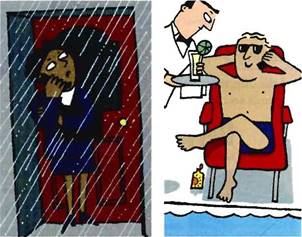
1 Where are they?
2 What are they wearing?
3 Who are they talking to?
4 How are they feeling?
5 What are they thinking?
6 What are they saying?
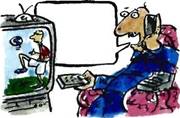
4 Match the two parts of these sentences. Number them Communicating vocabulary in order to make a complete e-mail.
|
|
I finish college this |
job's going well. |
|
|
summer, |
after so long. |
|
|
I hope your new |
because I want to study |
|
IL |
Great to hear from you |
during the week. |
|
|
I'm working with my |
so then I can find a real job. |
|
|
brother |
but I've got a new job too! |
|
|
He needs help |
in his shop. |
|
|
I'm only working at weekends |
and I need the money! |
Hi June
You won't believe it,
That's all for now. Keep in touch!
love Marty
Telephone language
1 Look at Tapescript 14.1. Find expressions which mean the same as the ones below.
Is that Julia? 2 This is Julia. Yes sweaking.
![]()
3 This is Michael speaking.
4 Can I speak to Robert, please? ![]()
5 Do you want me to give him a message? ![]()
6 Could he get back to me before
9.00 tonight? ![]()
7 OK, I'll just get a pen. ![]()
8 What's your number? ![]()
2
3
Choose the correct word to complete these sentences. 1 A Do you know Simon's address?
B No, I haven't got my address book / address list.
2 A What's their number?
B I don't know. Look it up in the phone book / phone list.
3 Excuse me. Is there a phone cabin / phone box near here?
4 What's your e-mail number / address?
5 I've got some letters here. Are you going past the postbox / postbag?
|
|
alarm |
clock |
answer |
|
second |
evening |
rings |
|
|
morning |
enter |
|
|
![]() This service turns your phone into an
clock. Sirnply set the
This service turns your phone into an
clock. Sirnply set the
2
![]() using the
24 hour
using the
24 hour
3
![]() . For
example, to be called at
. For
example, to be called at
![]()
the time. When your call comes through, the
![]()
![]() phone 8 several times. If
you do not 9 it, the phone rings again,
phone 8 several times. If
you do not 9 it, the phone rings again,
10
|
|
Reading |
instructions on making emergency calls. number do you call in an emergency in Britain? number can you try? emergency service do you ask for if you see a car emergency service do you ask for if you see having problems in the sea? the questions that the operator might ask emergency.
Flat 2B, 303 Leeds Street.
There's a fire in our kitchen.
I'm calling from a neighbour's fiat. |
Ambulance Coastguard sea and cliff rescue |
||
|
1 Read the 1 What 2 What other 3 Which accident? 4 Which someone 2 Complete 1 Operator
2 Operator
3 Operator |
|
|
Writing |
to this e-mail. yes, and suggest a meeting place and say no, apologize, and give a reason. |
|||
|
Write two replies In the first say • In the second |
15
1 Match the problems and the advice.
1 My watch has stopped.
2 1 need to be in Edinburgh by 9.00 a.m. on Monday morning. 3 Someone's stolen my wallet!
4 I bought this CD player yesterday and it doesn't work properly.
5 I think my wife has got food poisoning. 6 I haven't got any money left.
![]() You should take it back to the shop.
You should take it back to the shop.
You should go to the police.
You should take her to the doctor.
You should fly.
21 You shouldn't spend so much!
You should try putting a new battery in it.
2 Complete these dialogues. Start in three different ways.
![]()
1
A
How are ![]()
B Well, actually, not so good. I've got an awful headache. A Oh dear, you should
![]()
2
A
How's ![]()
B Not great. I forgot our wedding anniversary today. A Oh no! You should
![]()
3
A
How ![]()
B Could be better. My car broke down again this morning. A Oh? Perhaps you should
![]()
3 Complete these sentences - make them true for you.
I feel relaxed ... when the sun is shining.
1 I feel fed up when![]()
2 ![]()
![]()
![]() I feel happy when
I feel happy when![]()
3 I feel excited when![]()
4 I get upset when![]()
5 I feel tired when
Test your spelling lessons 13— 15 Choose the correct spelling library / librery woried / worried dificult / difficult excited / excitted computer / computter afternoon / afternon address / adress headacke / headache mesage / message traveling / travelling
16
Food
1 Label the picture.
2 Add two more things to the list in exercise 1.
|
I love |
I don't mind |
I can't stand |
|
|
3 Put different food or drink in each column.
In a restaurant 6 What's the most useful question for you to know In a
4
![]() Match the questions a waiter asks to the situations. restaurant?
Make a polite question that you can use with all these things.
Match the questions a waiter asks to the situations. restaurant?
Make a polite question that you can use with all these things.
Waiter's questions
1 Are you ready to order?
2 Would you like something to drink?
3 Coffee?
4 Anything else?
|
6 Would you !ike some dessert? |
7 |
Countable and uncountable nouns aren't just for food. |
|
Situations |
|
Are these nouns countable (C) or uncountable (U)? |
5 ![]() Smoking or non-smoking?
Smoking or non-smoking?
the menu?
more wine?
a bottle of water?
the bill?
![]() Countable and uncountable nouns
Countable and uncountable nouns
![]() furniture
C hair
furniture
C hair
When you first arrive in the restaurant informationluggage Before you look at the menu. moneynews After you look at the menu. problemadvice
|
|
Reading |
|
|
|
|
text about restaurants in Russia. Are these true (V) or false (X)?
always very high. towns also have a lot of restaurants. stay open in the afternoon. restaurants have music and dancing. idea to make a reservation. adjectives are all in the text. Which nouns go one?
prices
noun for each adjective. Use a dictionary |
|
|||
|
1 Read the sentences 1 There are 2 Prices are 3 Small 4 Restaurants 5 All 6 It's a good 2 These with each
high private
traditional energetic
loud
affordable
3 Find another to help you. |
|
course. |
8 |
Complete these sentences with the correct form of the |
|
After you finish eating your main course. |
|
verb in (brackets). |
|
After your meal |
|
1 The furniture in that shop |
|
5 Now match the waiter's questions to these answers. |
|
2 How heavy (be) your luggage? |
|
(Sometimes there is more than one possibility.) |
|
3 That information you gave me |
|
3_ Yes, please, black. |
|
useful. |
|
Not quite. |
|
4 My hair |
|
DI Yes, I'll have mineral water, please. |
|
5 The news |
|
Not for me, thanks. |
|
afraid. |
|
Um, yes a green salad,
please. |
|
6 Money |
|
No, thanks, can we just have the bill, please? |
9 |
Make four sentences with the other nouns in exercise 7. |
After you finish ordering your starter and your main
2 Complete the crossword. One answer is not a past simple verb - which one?
![]() Restaurant vocabulary
Restaurant vocabulary
1 Match these words and pictures.
a knife a fork a spoon a wine glass a jug a bottle salt and pepper chopsticks
the bill
Waiter
Customer
|
Waiter |
For how many? |
1 |
I r gog |
her at 10.00 last night |
|
Customer |
|
4 |
You |
what I said, didn't you? |
![]()
|
Waiter |
Yes, that will be fine. Could I take a name and phone |
7 |
It was sunny in the morning, but then it to rain. |
|
|
number? |
9 |
|
|
Customer |
|
1 1 |
She French and Spanish at a secondary school |
|
Waiter |
Thank you. We'll see you then. |
14 |
|
![]()
|
|
15 |
|||
|
18 |
18 'Was that pen expensive?' 'No, it about 80p.' 20 |
|||
|
Past simple |
22 She a blue dress. |
|||
|
1 Look at Tapescripts 18.1 and 18.2 and write questions |
down |
|||
|
for these answers. |
|
1 |
Last year I in the New York marathon. |
|
|
1 What film did Vic and Sarah see? |
|
2 |
There was an accident here yesterday — a car a cyclist. |
|
|
|
GO. |
|||
|
2 |
|
|
3 |
|
|
|
He did, but she didn't. |
|
5 |
I didn't take the bus, I |
|
3 |
|
|
6 |
|
|
|
In the pub. |
|
7 |
|
|
4 |
Fish pie. |
|
8 |
My parents me a CD player for my birthday.
|
|
5 |
|
|
12 |
I went to Italy two years |
|
6 |
A CD.
|
|
13
|
We two glasses of red wine. |
|
|
Because it was his birthday. |
|
16 |
His English wasn't very good, so we Spanish. |
|
7 |
|
|
17 |
'Did you come by train?' 'No, I |
|
|
About 9.30. |
|
19 |
She me an interesting story. |
|
8 |
|
|
21 |
|
It was horrible.
3
![]()
![]() Write six sentences about what you
did last weekend. Use the verbs in the box, and use didn't for two sen tences.
Write six sentences about what you
did last weekend. Use the verbs in the box, and use didn't for two sen tences.
buy see write have enjoy
4 Read this postcard. Put the verbs in (brackets) in the past simple. One is negative.
Dear![]()
I u.)an+cd +0 *hank gou -Cor a qrcak mcckcnd and
![]() 1 (choose) -•t-his card
because
1 (choose) -•t-his card
because
![]() 2 (tike,) pickurc, 1k 3 (remind)
ruc 04 4-hc conccr* me 4 (qo) +0 u.)i+'n gour brokher and his qid$ricnd.
2 (tike,) pickurc, 1k 3 (remind)
ruc 04 4-hc conccr* me 4 (qo) +0 u.)i+'n gour brokher and his qid$ricnd.
Ac4-ualt1.í, mc ![]() 5 (go) +0 ano+hcr conce,T4- task
nigh+, bu-k ik
5 (go) +0 ano+hcr conce,T4- task
nigh+, bu-k ik ![]() 6 (bc) veng di#crcnk. Mg parcnks
6 (bc) veng di#crcnk. Mg parcnks ![]() 7 (kakc) Ana and mc +0 scc euddg Cud.
I
7 (kakc) Ana and mc +0 scc euddg Cud.
I ![]() 8 (+hink) I
8 (+hink) I
like-d btucs,
bak ik u)asn'+ koo bad. Mg paren4-s loved i" bak Ana ![]() 9 (hake.) ik - in Cack, she
9 (hake.) ik - in Cack, she ![]() (Icavc) -Fhc inker-vat and re-alti.g
(Icavc) -Fhc inker-vat and re-alti.g
![]() 11 (upsck) parcnks. The, 1.ðorSk khinq LðaS •khak khCLJ
11 (upsck) parcnks. The, 1.ðorSk khinq LðaS •khak khCLJ ![]() 12 (pa¿-J) Cor 1k!"
12 (pa¿-J) Cor 1k!"
![]() (phone) her *his a$•f-crnoon, bu-f- I
onlg
(phone) her *his a$•f-crnoon, bu-f- I
onlg ![]() 14 (qc+) answering machine-.
14 (qc+) answering machine-.
Mg parcnks don'* a.)ank scc her aqain/ Hctp/ Ang ideas?
nctt, 4-ha+)s atl *Cor non. Hope. •khinqs arc going act! u.)i+h goa. E-mail ruc u)hcn gou have, kimc.
Ôorqc

|
-ed pronunciation |
last and ago |
|
|
5 Write the past simple of these verbs in the right |
6 Answer these questions about yourself. |
|
|
column. |
1 |
Where did you go on holiday last year? |
|
remember repeat close listen |
2 |
Where were you a week ago? |
|
cook book dance |
3 |
What was the most exciting thing you did last weekend? |
|
|
4 |
What did you have for dinner last night? |
|
|
5 |
What was the most interesting news you heard or read |
|
opened finished started |
|
last week? |
|
|
6 |
What was the worst filtm you saw last year? |
|
|
7 |
Where did you live five years ago? |
|
|
8 |
Do you speak better English now than you did a couple |
of months ago?
![]()
The number 'O'
7 Look at p.56. How do you say 40-0 in a game of tennis? Match these numbers with the descriptions. How can you say '0' in each one?
 305 7088 zero
305 7088 zero
![]()
8 Write a sentence using the word nothing. Test your spelling lessons 16—18
Write these words in full. cmptr = computer pzz clths vgtbls pppr frdg sndwch xpnsv brthdy
Comparative adjectives
1 Put the words in these sentences in order. Make each one true for you and give a reason.
out is relaxing than home more eating eating at Eating out is more relaxing than eating at home because
or
Eating at home is more relaxing than eating out because
1 train than bus by is travelling better by
2 than like evenings I mornings better
3 more I in a jeans than in suit comfortable feel
4 living the than is country the better in living city In
5 convenient a in in house more living flat than living a is
6 working a easier student is than being
2 Write three more sentences about your opinions.
Use adjectives from the box.
I think trains are more comfortable than buses.
|
bad comfortable |
happy quiet |
exciting clean |
crowded beautiful |
3 How much do you know about the world? Are these statements true (V) or false (X)?
1 Russia is bigger than China.
2 More people speak Portuguese than Spanish. 3 New York is further north than Moscow.
4 Los Angeles is hotter than San Francisco.
5 Scotland has higher mountains than Wales.
6 New Zealand has more sheep than people.
7 More people speak Japanese than Chinese.
8 Spain is more mountainous than any other country in Europe.
4 Compare these countries in as many ways as you can. When you compare two countries, draw a line between them.
Tanzania is larger than Iceland.
Saudi Arabia Iceland
Greece Argentina
|
China Austra\ia |
Tanzania Russia
Airport and in-flight vocabulary
1 Complete the words. The missing letters are all vowels
![]()
ch Ck- —n —c n —my cl—ss b ard ng p ss -n—ss cl—ss f rst cl—ss d p—rt r 10 —ng
s ngl g
t— ![]() rriv -l h Il p —ssp rt c- ntr—l r und tr— p b—gg r —cl
rriv -l h Il p —ssp rt c- ntr—l r und tr— p b—gg r —cl ![]()
Booking a flight
2 Macch che questions and the answers.
1 How many people are traveling?
2 When do you want to travel?
3 Single or return?
4 How would you like to pay?
5 ![]() What's the card number? 6 What's the
expiry date? Return, please.
What's the card number? 6 What's the
expiry date? Return, please.
3969 7854 3555 3212.
Two adults and two children.
Credit card, please.
August 2007.
E 99 |
Next Saturday.
21
Hotels and accommodation
1 Answer these questions and write the first letter of each answer to find a kind of holiday accommodation.
1 p.26 The Natural History Museum is in this road.
2 p 23 She likes black and white films.
3 p 08 She writes Jim an e-mail![]()
4 p 53 The name of the restaurant on Nicholson Street.
5 p 7 1 The name of Rita's daughter.
6 p 77 She lives in the Solomon Islands.
7 p 40 He's working at Pizza Rapide. 8 p. 04 Maria's surname.
9 p 32 The police constable's first name.
2 ![]()
Complete the gaps in this
dialogue.
A Hello, York Hotel.
![]() Hello, 'd
Hello, 'd![]() book a
book a ![]() for this Wednesday, please.
for this Wednesday, please.
A Certainly, sir. What ![]() room
room ![]() like?
like?
B A single with en suite![]() please.
please.
A
Yes,![]() single free.
single free.
B
Could you tell me![]()
A It's £85.
![]() breakfast? A Yes, it
does.
breakfast? A Yes, it
does.
B OK. Can I ![]() later to confirm?
later to confirm?
1 Compare these descriptions of hotels in Bangkok Grace Hotel and Helsinki and answer the questions. Underline the parts that tell you the answers. Bangkok 1 Which hotel is better for people who don't like smoking? Anta Hotel 2 Which hotel doesn't have a restaurant? 3 Which hotel is better for people who like swimming? 4 What kind of guests does the Anta Hotel want? 5 Which hotel is closer to the airport? 6
Name one
facility found in the Anta Hotel, but not in the Grace Hotel 7 What kind of food does the Grace Hotel offer? Anta Hotel 8 Which hotel lets you send faxes from your room? Helsinki 2 Find the opposites of these
adjectives in the hotel The Anta Hotel is a descriptions. The Grace Hotel is
an welcoming hotel situated in unfriendly
local conditioning, mini-bar, leisure guests. All rooms
colour TV with video, have air-conditioning, minitelephone, personal safe and
bar, TV and telephone. There facsimile machine. There is is a sauna and hotel
bar. The aqobby bar, coffee shop, vicinity has a number of
100 |
||||||||||||||||||||||||||||
A Yes, of
course.
3 Where did these people stay on holiday? Use the words in the box.
![]()
camp-site hotel guest-house camper van self-catering apartment
![]()
![]()
1 wc nankcd somckhinq tikc a hokc(, buk- no-F as expcnsivc.
2 We wanted a bed to sleep in, but we also wanted to cook for ourselves.
3 We wanted -to -tour around by
ourselves. 4 We IA)Lw+ec.l +0 ![]() +0+.
+0+.
5 1.VQ-n½ed comÉÞrk, and
Test your spelling lessons 19—21
One word in each sentence is misspelt. Can you find it and correct it?
1 The countryside is very mountanous.
2 1 really don't like big citys.
3 The wether's really cloudy.
4 1 think camping's unconfortable.
5 There are too many advertisments on television.
22
Present perfect
1 Put the words in the right order to make sentences.
1 haven't before flown they They haven't flown before.
2 ? you been ever Edinburgh have to
![]()
3 any never money won I've
![]()
4 studied I before English haven't
![]()
5 Kathryn times have how you ? many met
![]()
6 bought she a has car ? before
![]()
7 have Russell been hasn't to but Tokyo I
![]()
8 times seen that we've three film
![]()
2 Choose the correct form of the verb.
1 I've been / I went to the theatre twice this week.
2 Mike and Jenny have come / came for dinner iast weekend.
3 We have never visited / We never visited Mexico before.
4 Have you ever seen / Did you ever see Pulp Fiction? 5 How often have you had / did you have a real Italian pizza? 6 I have saved / I saved enough money to go on holiday to France last year.
7 A Did you have a good time?
B Yes, I have/ I did.
8 Atlético Bilbao have won / won the championship last night.
3 Write down five things you've never done that you'd like to do one day.
I've never been hang-gliding.
Money vocabulary
4 Each sentence has an anagram of a 'money' word in it. Write the word correctly and complete the sentence with a preposition from the box.
![]()
1
You can ![]() (RROWOB) money me if you need
it.
(RROWOB) money me if you need
it.
2 Can I ![]() credit card?
credit card?
3 Have you got ![]() (HGCNAE) a pound? 4 Don't
(HGCNAE) a pound? 4 Don't ![]() (DNLE) money
(DNLE) money ![]() Jake. He never pays you back.
Jake. He never pays you back.
5
I'm OSVAGN) ![]() a holiday this summer,
a holiday this summer,
but always seem to (DSENP) as fast as J
(NRAE)
![]()
6 How do you want to pay? (QUCHEE)
![]()
![]() (RDITEC DARC) or
(RDITEC DARC) or ![]()
![]() (SHACÞ
(SHACÞ
5 What is expensive and what is cheap in your country? Try to write three things in each column.
![]()
cheap average expensive
![]()
eating out
![]()
6 Now write five sentences about prices in your country.
Public transport is cheap, especially if you buy a travel card. Eating out can be very expensive.
23 Internet shopping
3 Read this article. Are you the same as Nicola?
Describing things
1 Look at the pictures. Where can you buy each of the
icola Murphy has already started doing her Christmas shopping on the Internet. She
3 usually spends about
• £300 on presents and pays for them on her debit card. The
|
|
Reading |
|
|
|
|
|
extract from a travel guide and choose the best questions. exchange money officially at all hotels and However, remember you can only scll foreign You cannot buy it back, so only change you need. American dollars are the easiest to change. need to transfer money from abroad, American (office in the main square) is the easiest way. also send cash via any post office, usually 24 hours. hotels, many shops and the better restaurants major credit cards. Banks will cash traveller's but the commission can be high. sure you have enough money for the weekend. banks are closed, and some hotels will tell you to Monday. |
1 2 3 4 5 |
You can change money . in hotels and banks. only in banks. • only in hotels. The guide advises readers to buy lots of local currency. not to buy local currency. to buy no more local currency than necessary. Tourists can use credit cards in • all restaurants. • more expensive restaurants. • hotel restaurants only. Banks • sometimes charge you a large commission for changing traveller's cheques. • charge you a small commission for changing traveller's cheques. • don't change travelier's cheques. You can change money in banks . at any time. • at weekends only. • on weekdays only. |
|||
|
Read this answer for the
currency. what currency If you Express You can within Most accept cheques, Make The wait till |
35-year-old sales manager is buying food and drink from
• supermarket shopping services and has ordered books and CDs from on-line bookshops.
'Buying over the Internet saves me a lot of money,' says Nicola, 'and it's a lot nicer staying at home than having to go out in the High Street. I only buy from well-known companies.'
Nicola
also likes the fact that she doesn't have to take her two children, Sally (3)
and Lisa (6) around the supermarket 2 Choose three objects you don't know the
name of in with her. l ! sit down in the evening, check
the cupboards in English. Look up the words in a dictionary and write a the
kitchen, and prepare my shopping list,' she says. 'l very short description of
each. . rarely forget things any more.' video tapes ![]()
They're for recording films or TV programmes, and you can buy them in a music shop or in some large supermarkets.
4 Write questions for these answers from the text. Use these question words to help you.
When?
• How?
• Which?
• How much?
• Why?
1 Why does Nicola like Internet shopping?
Because it saves a lot of money.
2
About £300.
3 ![]()
In the evening.
4 ![]()
35.
5![]()
Only well-known ones.
![]()
![]() 6
6
![]()
She doesn't have to take her young children to the supermarket.

24 Your country and Britain
2 How much do you know about clothes? Answer these
|
Clothes vocabulary 1 Complete the spidergram with these clothes and accessories. Add another item to each box.
|
questions for your country and for Britain. 1 Do men and women usually wear hats to a wedding? 2 Do visitors take their shoes off when they come into the |
|
jeans T-shirts a watch |
![]() house?
trainers gloves a suit
house?
trainers gloves a suit
3 Do people take their hats off in a religious place? make-up shorts sandals a ring sunglasses bright colours 4 Do businesspeople always wear a suit to work?
5 Do people wear shorts in the city?
![]() Do
women wear short sleeves?
Do
women wear short sleeves?
Do women wear trousers?
Do male teachers always wear ties to work?
Do women wear whjte to get marrjed?
Do women wear black when they lose their husbands?
women usually do.
Reading
Read this description of Scottish traditional dress and label the photograph.
1 he tartan kilt has long been the traditional dress in 1 Scotland. Different tartans belong to different clans or families. The first time that everyone in a clan started to wear the same tartan was in 1 61 8. One of 3 the most famous tartans is the Black Watch Tartan, which was designed in 1 740 especially for the Black Watch regiment. The modern kilt that we can see today was made in the 1 800s. It is not as big and heavy as the original kilt or 'philabeg', as it was
4
called. Nowadays, all Scots can find the tartan for 5 their own clan or family.
Scotsmen traditionally wear the kilt with a jacket, a white shirt, thick socks and black leather shoes. Round their waists they wear a sporran (a kind of purse) and in one sock they wear a traditional dirk (a small knife). On their heads they sometimes wear a beret. Women wear tartan too, but not with a sporran or a dirk. Many wear a simple white dress with a tartan plaid.
Nowadays, you don't see kilts every day, but men still 6 7 wear them for weddings, dances, and rugby matches.
8
9
Writing
What is the traditional costume in your country? Is it different for men and women? When do people wear these clothes? Write a short description of the costume. You can draw a simple picture to help you, or find a photograph.
|
Test your spelling lessons 22—24 |
|
Can you correct the mistakes in
these words? borow fleace |
Student A
Look at your map. You want co find these places.
![]() a Chinese restaurant
a Chinese restaurant ![]() a music shop
a music shop ![]() a café
a café ![]() a photographic shop
a photographic shop
![]() a camping shop
a camping shop ![]() a newsagent
a newsagent
Ask your partner questions and mark the places on the map. Try to use different questions.
Excuse me, is there a (good) near here?
![]()
Do you know if there's a (good) around here?
![]()
Do you know where there's a (good) 7
![]()
Student A
![]() CLUBCARDS
CLUBCARDS
DIRECTOR
CLUBCARDS LTD TEL
![]()
9 FAX
![]()
![]() LONDON E-MAIL sw
LONDON E-MAIL sw![]() www.
www.![]()
Diana Berry
|
2704 17th Avenue telephone (403) 686-2455 Calgary Alberta AB T3N 2V6 www.endplatedesign.com 21 SINGLES & DOUBLES Student A You want to book a hotel room in Cape Town. Decide what you want and complete the table. How many
people are in your group? What
type(s) of room do you need? When are you arriving? Decide what you want the hotel to offer - choose three |
Endplate Design![]()
![]()
![]() things:
things:
breakfast included conference facilities a minibar in the room a gym a casino
![]() a sauna a choice of restaurants close
to city centre satellite TV
a sauna a choice of restaurants close
to city centre satellite TV
Student B
Look at your map. You want to find these places.
![]() a shoe shop
a shoe shop ![]() a gift shop
a gift shop ![]() a supermarket
a supermarket ![]() a bookshop
a bookshop ![]() an Italian restaurant
an Italian restaurant ![]() an electrical shop
an electrical shop
Ask your partner questions and mark the places on the map. Try to use different questions.
Excuse me, is there a (good) near here?
![]()
Do you know if there's a (good) around here?
![]()
Do you know where there's
a (good) ![]()
Student B
![]() CLUBCARDS
CLUBCARDS
DIRECTOR
|
CLUBCARDS LTD |
TEL 020 8540 9111 |
|
9 LYON ROAD |
FAX 020 8543 5115 |
|
LONDON |
E-MAIL DICK@CLUBCARDS.CO.UK |
|
SW19 2RL |
WWW.CLUBCARDS.COM |
Diana Berry![]()
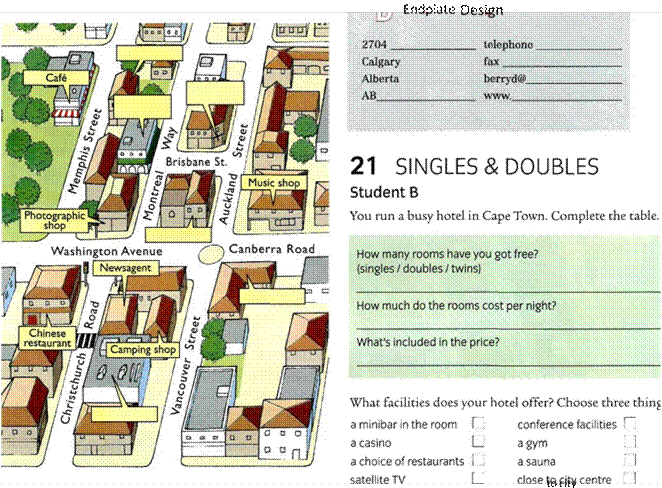
PAIR WORK ACTIVITIES
|
0 1 LETTERS & NUMBERS |
05 PEOPLE & PLACES |
7 A Excuse me, do you know if there's a chemist's near here? B Yes, there's one in that big shopping centre. |
|
1 You can get me in the office on 01864 665207. |
1 She teaches university students. |
8 A Is there a supermarket near here? |
|
2 It's the fifth. |
2 She goes to work at 8.30. |
B Yes, it's on this main road, on the left. |
|
3 It's 147. |
3 She washes her hair every morning. |
A Sorry? |
|
4 26. |
4 She studies French and German. |
B Just down here, on the left. |
|
5 0794 5663661 |
5 She misses her family. |
|
|
06
|
JOBS & WORK What do you do? |
|
B
|
I'm a doctor. What do you do? |
|
B
|
I work for a publishing company. What do you do? |
|
B |
I'm a teacher in a primary school |
|
07 |
LOVE & HATE |
6 The ninth of July.
I A What's your phone number? B You can get me in the office on 01864 665207.
2 A What's the date today?
B It's the fifth.
3 A How old are you? B 26.
4 A What's your mobile phone number?
B 0794 5663661![]()
5 A What's your house number? B It's 147.
6 A When's your birthday?
B The ninth of July.
03 FRIENDS & RELATIONS
Diana
I live in a house in a village near Oxford. It's about 80 years old and made of stone. We've got a living room, study. dining room, and kitchen downstairs. Upstairs
there are three bedrooms and two bathrooms - one of them is en suite. t think my favourite room has to be our bedroom - it has a view of the garden and the hills beyond. My husband and I love gardening. so we spend a lot of time outside in the summer.
Shawn
My apartment is on the third floor of an old wooden house. It's pretty big for one person, but that's good. It's got two bedrooms and a very large living room, which is great for me because I travel a lot and bring lots of things home with me. There's a small kitchen
with a balcony leading off of it, and a decent bathroom. My favorite room's the living room. That's
where I watch IV and listen to music. It's also where the air-conditioning is - it gets hot in Boston in the summer.
04 LIFE & ROUTINE
![]() I usually get up at about 6.30. I
just have coffee for breakfast. I get the bus to work. If I'm late I take a
taxi, which is a bit expensive. My wife goes by bike, she likes to keep fit.
I usually get up at about 6.30. I
just have coffee for breakfast. I get the bus to work. If I'm late I take a
taxi, which is a bit expensive. My wife goes by bike, she likes to keep fit.
2 I always go to the gym at lunchtimes, about
12.30 or 12.45. I have a shower there too, and I often go to the café for lunch.
3 I leave the office at around 6.00 and maybe meet some friends for a drink. don't watch much telly, too much to do, and I never go to bed before
1 I love eating out at the weekend.
2 1 can't stand doing nothing.
3 1 really like watching IV in the evenings.
4 1 quite like clubbing.
5 1 hate reading the paper.
![]()
![]()
![]()
![]() I love
windsurfing ... the sea. the fresh air
I love
windsurfing ... the sea. the fresh air
2 Sometimes I just like sitting around. doing nothing.
3 I can't stand noisy pubs. I can never hear people.
4 I quite enjoy being alone. I don't always need company.
5 I hate getting up when it's still dark.
6 I quite like watching football on the box, but I prefer being there.
7 I don't like gardening. It hurts my back.
8 I really hate the weather here. It's so depressing.
![]()
09 ROADS & ROUNDABOUTS
Could you tell me where the museum is, please?
Yeah, it's near the roundabout.
Is there a Chinese restaurant near here? Yes, it's on that side street. near the traffic lights.
Excuse me. Is there a post office near here? Yes, there's one just down there, between the lights and the shopping centre.
Excuse me. is the art gallery near here? Yes. it's there, on the corner. Excuse me. is this the way to the Italian restaurant?
Yes, keep going, it's next to the bridge. Could you tell me where the cinema is, please?
Do you know the museum? It's opposite there.
Could you tell me where the bus station is? Excuse me, is there a post office near here?
10 GOOD & BAD
1 It was really good. I read it in a week.
2 ![]() thought it was disappointing. I
usually like thrillers, but this was boring. And three hours was much too long.
thought it was disappointing. I
usually like thrillers, but this was boring. And three hours was much too long.
3 The food was really good, but it cost over £40, which is a lot.
4 It was nothing special - the café was better than the paintings!
5 I thought it was awful - I gave up on page 20.
6 It was absolutely fantastic - I love Cuban music.
I A What did you think of the book? B It was really good.
2 A How was the film?
B I thought it was disappointing.
3 A What was the restaurant like last night?
B Well, the food was really good![]()
4 A How was that exhibition you went to? B It was nothing special.
5 A How was the book?
B I thought it was awful .![]()
6 A What was the concert like? B It was absolutely fantastic.
1 It was really good.
2 1 thought it was disappointing.
A
![]()
![]()
![]()
![]() 3 The food
was really good . 4 It was nothing special.
3 The food
was really good . 4 It was nothing special.
B
![]()
![]() 5 1 thought
it was awful
5 1 thought
it was awful
2 A 6 It was absolutely fantastic.
B 1 1 OUT &ABOUT
3 A
B Conversation 1
A What are you doing this weekend?
4 A B Oh. nothing much. Shopping, maybe. and a bit of
B
5 A A Well, if you feel like it, Belta and are going out for dinner on Saturday. and you'd be more than
B welcome to come.
6 A B That sounds great - where are you going?
A That Italian place, Umberto's. The food's really
B excellent. We're meeting Keith there about 8.00.
Do you know where it is?
B No, I don't actually.
A Well, we're driving so we can pick you up. About C A What's the best way to get there? Michael 224 6785.
7.45? B Probably by taxi. Julia 224 6785. Fine.
B OK. See you then. d A Is it better to fly or go by train? Michael If he can't do that, I'll be at home until Conversation 2 B It depends - flying's much faster. 8.30 tomorrow morning.
A
B We're going to Paris! Jane saw a special offer, £69 B Yes, sure. morning.
all in, so we thought let's go for it. f A Do I need to change? Michael Great. Thanks. Julia. Bye.
A Fantastic! When are you leaving? B No, it's direct. Julia OK. Bye.
B We're getting the train on Friday evening, at 7.30. How much is that? g A
A And is everything included? Accommodation and Deirdre Hello? B £27.50.
everything? Jim Hello, is that Deirdre? B Yeah, but we're not staying anywhere nice, I don't A How far is it? Deirdre Yes, speaking. h
B About 50 miles.
A Absolutely. Well, have a great time. And we'll seeA Where does the bus leave from? Deirdre No, I'm sorry. He's at the library. Can I take you on Monday. B The central bus station.
a message?
B 0K. See you then. j A Is this the bus for London? Jim Yes, please. It's about our meeting
B Not you want the blue one over there. Can he phone me back before
tomorrow. k A What time do we get there?
1 I'm meeting Mary for a coffee. 7.00 this evening? I'm going out then. B Just after 11.00.
2 ![]() I'm going to a Chinese restaurant with
some Deirdre 0K, just let me get a pen. Right before friends.A How often do the
buses go to the city centre? 7.00. What number can he get you on?
I'm going to a Chinese restaurant with
some Deirdre 0K, just let me get a pen. Right before friends.A How often do the
buses go to the city centre? 7.00. What number can he get you on?
3 Staying in and watching TV. B Every ten minutes or so. Jim 334 6885.
4 Nothing special. Deirdre That's 334 6885. Fine.
5 I'm going down to London for the day. 1 This is a platform alteration. Would all passengers Jim Great. Thanks, Deirdre. Bye. 6 I'm spending a couple of days with my parents. waiting on platform 7 for the 10.30 to Deirdre OK. Bye.
Paddington please go to platform 5? Platform 5
15 UPS & DOWNS
I A What are you doing after this lesson? for the 10.30 to Paddington.
B I'm meeting Mary for a coffee. 2 GNER apologizes for the late arrival of the 12.15 from London King's Cross. It is currently 35 1 How are you doing? 2 A What are you doing for dinner tonight? minutes behind schedule and is due to arrive at 2 How's life?
B I'm going to a Chinese restaurant with some
17.15. 3 How are things? friends.
3 Flight BA1462 to Newcastle is now boarding at 4 How are you?
3
A What are you doing this evening? gate A34. Gate A34 for BA1462 to Newcastle. 5 How's it going?
Staying in and watching TV. 4 All Qantas and British Airways flights leave from B
4 A What are you doing tomorrow evening? terminal four.
B Nothing special. 5 and we'll be coming round with drinks and a I A How are you doing?
5 ![]() A What are you doing on Saturday? B
Not so bad, thanks. I'm going down to London for the day. 2 A How's life? 6
A What are you doing this weekend? B Great!
A What are you doing on Saturday? B
Not so bad, thanks. I'm going down to London for the day. 2 A How's life? 6
A What are you doing this weekend? B Great!
B I'm spending a couple of days with my 3 A How are things?
parents. B Not so good, really. 4 A How are you? 12 TRANSPORT & TRAVEL B Fine, thanks.
5 A How's it going?
B Could be better. I A Could you stop here, please?
B Sure.
A How much is that? 1
B £5.40, please. 2
A Here you are. Keep the change. And could I 3 have a receipt, please? 4
2 A Excuse me. Is this the train to Glasgow? 5 B Yeah, it is. 6 A What time does it get there? B 6.33. 7
3 A Can I help you?
B Yes, I want to go to Dublin this weekend.
What's the best way to get there? I
A
![]()
![]()
![]() Well, there
are lots of cheap flights at the moment, in fact we've got a special offer 4 A
The city centre, please.
Well, there
are lots of cheap flights at the moment, in fact we've got a special offer 4 A
The city centre, please.
B That's 75p.
A Sorry, how much djd you say? 2 B 75.
5 A A return to London, please.
3
B That's £27.50. It'll be £16.00 if you can wait till 9.00.
A It's OK, I need to travel now.
B 0K, that's £27.50 then, please.
![]() .2
.2
4
A Is the flight direct?
B No, you have to change in Singapore.
A ![]() How long is the journey?
How long is the journey?
B Two and a half hours.
fight snack. Our flight time today is about 55 minutes, so we should be arriving at around 2.30 local time.
13 HERE & NOW
1
1 You have one message. Please wait.
Hi, it's me. I'm on the train. We're just leaving the station, and it's still raining. The train's really busy tonight, but at least it's not late, so I should be home soon. I'm having a burger right now, so The sea.
don't worry about dinner. Love you. Thank you for waiting. 2 You have no old messages and one new message. A dog whimpering.
Hi, it's Michael. I'm having a couple of beers in At the dentist - Open wide wider.
the pub with John, so I'll be home a little late. Classical music.
Keep the dinner warm! Bye. You have exactly three hours. The exam starts 3 You have one new message. now.
Hi, just me. We're on our way back now. Mary
|
|
A |
Are you all right? You look a bit fed up. |
|
|
|
B |
Yes, I am. |
|
|
14 CALLS & MESSAGES |
A |
What's wrong? |
|
|
|
|
B |
I'm trying to send an important e-mail and |
|
Julia |
Hello? |
|
my computer keeps crashing. |
|
MjchaeJ |
HejJo? Js that Jujja? |
A |
You don't look very happy. What's the matter? |
|
Julia |
Yes, speaking. |
B |
Oh, I've got an exam today and I'm so |
|
Michael |
It's Michael here. Is Robert there? |
|
nervous. I really don't feel very well. |
|
Julia |
No, sorry. He's at the gym. Can I take a |
A |
How are you? |
|
|
message? |
B |
Fine, thanks. |
|
Michael |
Yes, please. It's about the meeting |
A |
You don't look fine. You look worried. |
|
|
tomorrow. Can he phone me back before |
B |
Well, yeah. I'm a bit stressed about work right |
|
|
9.00 tonight? I'm going out then. |
|
now and I get very tired working so late. |
|
Julia |
0K, just let me get a pen. Right he's to |
A |
Wow! You look excited! |
|
|
phone you back before 8.00. |
B |
Mm! I am. Feeling very happy. in fact! |
|
Michael |
Not before 9.00. I'll be in till 9.00. |
A |
Well, come on. Tell me! |
|
Julia |
Sorry, before 9.00. What number can he call you on? |
B |
Jake's asked me to marry him! |
Will you marry me? wants to pop into the supermarket first. Just what I need my feet are killing me. Can you get in a pizza? Thanks. Bye.
TAPESCRIPTS
Sarah Yeah, we met her in the pub, and she gave Vic Part 2 a CD for his birthday, so he was very pleased! Travel agent
How would you like to pay?
A How are you?
B Fine. thanks.
A You don't look fine. You look worried.
B Well, yeah, I'm a bit stressed about work right now and I get very tired working so late.
A I think it's crazy. You should talk to your boss about how you feel. and you shouldn't work so many hours. You've got a life to live!
6
A You don't look very happy. What's the matter?
B Oh, I've got an exam today and I'm so nervous. i really don't feel very well.
A Maybe you should take some aspirin and go to bed for an hour.
17 CAFÉS & RESTAURANTS
|
Waiter |
Hello, Caprice. |
|
|
|
Customer |
Hello, I'd like to book a table, please. |
|
|
|
Waiter |
Certainly, when for? |
|
|
|
Customer |
This evening, about 8.30. |
|
|
|
Waiter |
How many people? |
|
|
|
Customer |
Six. |
|
|
|
Waiter |
Right, let's have a look. Yes, that's fine. And the name is? |
|
|
|
Customer |
Lambeth, that's L-A-M-B-E-T-H. |
|
|
|
Waiter |
Thanks, and could I just take a phone number? |
|
|
|
Customer |
Yes, it's 554 2888. |
|
|
|
Waiter |
Great. See you at 8.30, Mr Lambeth. |
|
|
|
18 |
SATURDAY & SUNDAY |
||
|
Bruce |
Hi, Vic. How was your weekend? |
||
|
Vic |
Welt, I came to the office on Saturday morning, but I had a great time after that. |
||
|
Bruce |
What did you do? |
||
|
Vic |
It was non-stop - tennis, pub,
cinema . |
||
|
Bruce |
What film did you see? |
||
|
Vic |
Go. It was
brilliant. Sarah didn't think so |
||
|
Bruce |
I tried to phone you, but you weren't in. Karen came round for dinner. |
||
|
Vic |
How did it go? |
||
|
Bruce |
A
disaster. I made fish pie but I left it in the oven too long. It didn't come
out very well . |
||
|
Vic |
Oh. |
||
|
Bruce |
Then we had a row and Karen left early. Not a very good
evening |
||
|
Karen |
Hi there, Sarah. |
||
|
Sarah |
Oh, hi. How was your weekend? How was the romantic dinner with Bruce? |
||
|
Karen |
It wasn't a great success. I went round to his place, and he made dinner for me, but it was horrible. And then we had a row. In the end I left at about 9.30. |
||
|
Sarah |
Oh dear, |
||
|
Karen |
Yeah, well. What about you? What did you |
||
![]()
|
Sarah |
I went to the pictures with Vic. We saw a film called Go. I don't recommend it! Vic really liked it, but I thought it was terrible. |
|
Karen |
Did you see Alison? |
|
Pity you weren't
there |
Ms McCall |
Visa, please. |
|
|
Karen You can say that again |
Travel agent |
Could I have the number? |
|
|
|
Ms McCall |
It's 4929 4781 3111. |
|
|
|
Travel agent |
And the expiry date? |
|
|
opened |
Ms McCall |
07/06. |
|
|
finished |
Travel agent |
And the holder's name? |
|
|
started |
Ms McCall |
RS McCall, that's Mt smalt c, capital C, A, double L |
|
|
19 |
TOWN & COUNTRY |
Travel agent |
Great. So that's a return to Barcelona, leaving 15 June 08.20, returning 1 Jl.fly |
|
Jan |
You're looking brown. Where've you been? |
|
1 5.15. |
|
Lucy |
I've just got back from Australia and New |
Ms McCall |
Yeah, that's right. |
|
|
Zealand. |
Travel agent |
0K. If I could give you a reference |
|
Jan |
Wow! You lucky thing! How long were you |
|
number. It's CT 12435. Phease quote |
|
|
there for? |
|
that number if you have any queries. |
|
Lucy |
Nearly a month altogether - the first two |
|
Could you confirm your address and |
|
|
weeks in Australia, and then a week and a half |
|
postcode? |
|
|
in New Zealand. |
Ms McCall |
Yes, it's 22 Castle Road, Edinburgh. |
|
Jan |
What was it like? |
Travel agent |
And the postcode? |
|
Lucy |
Absolutely fantastic. Australia was great - |
Ms McCall |
EH8 7DS. |
|
|
beautiful cities, brilliant night life, wonderful |
Travel agent |
Fine. The ticket will be in the post - |
|
|
beaches, but a bit crowded |
|
you should get it tomorrow. |
|
Jan |
What was the weather like? |
Ms McCall |
Thanks, bye. |
|
Lucy |
Sunny every day! It was so hot. I got sunburn the first day, and I needed factor 20 for days! |
Travel agent |
Bye. |
|
Jan |
Where did you stay? |
21 SINGLES & DOUBLES |
|
|
Lucy |
Actually, in some very comfortable hotels, and |
|
|
|
|
they weren't expensive either. |
Receptionist |
Hello, Hotel Excelsior. |
|
|
|
David |
Yes, hello. I'd like to book a room for |
|
Jan |
How about New Zealand? |
|
this Friday and Saturday, please. |
|
Lucy |
New Zealand was much quieter than Australia. |
Receptionist |
Certainly, sir, what kind of room would |
|
|
The countryside is a lot greener and more |
|
you like? |
|
|
mountainous. Unfortunately it's a lot cloudier, |
David |
A double room with en suite bathroom, |
|
|
too, but we thought it was more beautiful. |
|
please. |
|
Jan |
'We'? Who's 'we'? |
Receptionist |
Yes, we have a double free at $225 |
|
Lucy |
Secret |
|
with breakfast. |
|
|
|
David |
OK. Can I phone back later to confirm? |
|
20 |
TICKETS & FLIGHTS |
Receptionist |
Yes, that's fine. |
|
|
|
David |
0K, thank you. Goodbye. |
|
|
Receptionist |
Goodbye. |
|
|
|
Receptionist |
Hello, the Majestic. |
|
|
|
David |
Yes, hello. I'd like to book a double room with en suite bathroom for Friday and Saturday, please. |
|
|
|
Receptionist |
I'm afraid ail the en suite doubles are taken, sir. We can offer you two en suite singles. |
|
|
|
David |
How much are the two singles? |
|
|
|
Receptionist |
They're $90 each. |
|
|
|
David |
Is that with breakfast? |
|
|
|
Receptionist |
No, that's just the rooms. |
|
|
|
David |
OK, thank you. I'll think about it. Goodbye. |
|
|
|
Receptionist 3 |
Goodbye. |
|
|
|
Receptionist |
Hello, Hotel Excelsior. |
|
|
Travel agent |
And coming back on the first there's |
David Yes, hello. I'd like to confirm a booking |
|
|
|
09.00 arriving 11.15 or 15.15 arriving 17.50. |
|
for this Friday and Saturday, please
.. |
|
Ms McCall |
The 15.15, please. |
|
|
|
Travel agent |
OK. |
1 |
Do you have any rooms free for tomorrow night? |
|
Ms McCall |
And could you tell me how much that |
2 |
I'd like to book a double room for Friday and |
|
|
is, please? |
|
Saturday. |
|
Travel agent |
Yes, sure. It'll be £90, which includes |
3 |
Can I phone back later to confirm? |
|
|
airport tax. |
4 |
How much is a single? |
|
Ms McCall |
0K, that's fine, |
5 |
Is that with breakfast? |
|
Travel agent |
How would you like to pay? |
6 |
I'd like to confirm a booking, please. |
Part 1
Travei agent Hello, Timetravel, Andy speaking, how can I help you?
Ms McCall Oh hello, I'd like to book a flight, please.
Travel agent Where to?
Ms McCall To Barcelona.
Travel agent And when would you like to travel?
Ms McCall 15 June, if possible.
Travel agent And coming back?
Ms McCall The first of July.
Travel agent And how many people is that for?
Ms McCall Just me,
Travel agent OK, bear with me for a moment ...
We've got flights on the fifteenth at
08.20 arriving 10.50 and at 16.40 arriving 19.20.
Ms McCall The 08.20 would be good.
![]()
|
22 |
WHEN & WHERE |
Assistant Do you mean a camera? Customer No, the thing in the camera. What's it called? |
||
|
Alex |
Mark, have you ever been to Canada? |
Assistant Oh, the film. |
||
|
Mark |
Yeah, a few times. I went on a work trip to Toronto last year. Why? |
Customer Yes, that's it. |
||
|
Alex |
Well, need your advice. I'm spending three weeks on holiday there next month, and I'm not sure about the best way to take money. |
24 SUITS & BOOTS |
||
|
Mark |
I've always taken credit cards - you can use |
1 I'm not very sporty, but everyone wears them - |
||
|
|
them everywhere, and you don't need to carry |
they're just really comfortable. |
||
|
|
cash around. |
2 I keep everything in it - keys, cheque book, |
||
|
Alex |
Have you ever lost them? |
driving licence, make-up, address book ... I'd be |
||
|
Mark |
Only once. I left my wallet on a table in a |
lost without it! |
||
|
|
restaurant, and luckily the manager phoned |
3 I hate having cold hands, so I really love them. |
||
|
|
my hotel. |
4 I prefer them to a skirt - much more practical, |
||
|
Alex |
And what about traveller's cheques? |
especially with all those pockets. |
||
|
Mark |
I haven't used them for years. They're OK, and |
5 It's very light and very warm, but it lets the wind |
||
|
|
most hotels will change them, but you pay commission when you buy them, it's about |
through and it isn't waterproof. |
||
|
|
30/0 |
1 |
|
|
|
Alex |
True. Yeah, it sounds as if credit cards would |
Shop assistant |
Are you all right there? |
|
|
Mark |
be best. Definitely. And maybe some cash, a few |
Customer |
Just looking, thanks. |
|
|
|
hundred dollars, for taxis and
things . |
2 |
|
|
|
Alex |
0K, well, thanks for the advice. |
Shop assistant |
Can I help you? |
|
|
Mark |
That's OK - have a good trip! |
Customer 3 |
Yes, have you got these in a large? |
|
|
23 |
SHOPS & SHOPPING |
Customer |
What do you think? |
|
|
|
|
|
Friend 4 |
It looks great. |
|
I |
A |
I'd like some travel sickness pills, please. |
Shop assistant |
Any good? |
|
|
B |
We've got them in boxes of 12 or 24. |
Customer |
Yeah, I'll take this one, please. |
|
2 |
A B |
Have you got this jacket in extra large? Hold on, I'll just check for you. |
|
|
|
3 |
A B A |
Could I try these boots on, please? What size are you? I think I'm a 39. |
|
|
|
4 |
A B |
Have you got any English-Spanish dictionaries? Yes, on the third floor. |
|
|
|
5 |
A B |
Could you tell me where the bread is? Yes, it's in aisle seven. |
|
|
|
6 |
A B |
I'd like to send this letter, please. First or second class? |
|
|
|
7 |
A B |
How would you like it? Two tens and a twenty, please. |
|
|
|
8 |
A B |
Have you got any French newspapers? No, sorry, we're sold out. |
|
|
|
1 |
Can I help you? |
|
|
|
|
2 |
Do you mean a camera? |
|
|
|
|
3 |
What's it called? |
|
|
|
|
4 |
What are you looking for? |
|
|
|
|
5 |
I don't know the word in English. |
|
|
|
|
6 |
I wonder if you could help met please. |
|
|
|
|
7 |
Yes, that's it. |
|
|
|
|
8 |
I don't know what it's called in English. |
|
|
|
|
Assistant Can I help you? Customer Yes, I'm looking for something, but I don't know the word in English. It's for putting photographs in. Assistant Oh, a photo frame. Customer Yes, that's it. 2 Customer Hello. I wonder if you could help me, please. Assistant Of course. What are you looking for? Customer That's the problem - I don't know what it's called in English. It's for taking photographs. |
||||
![]() Infinitive Past simple Past
participleInfinitive Past simple Past
participle
Infinitive Past simple Past
participleInfinitive Past simple Past
participle
be was / were beenlose lost lost become became becomemake made made begin began begunmean meant meant break broke brokenmet met bring brought broughtpay paid paid build builtput put put buy bought boughtread read read catch caught caughtride rode ridden choose chose chosenring rang rung come came comerun ran run cost cost costsay said said
cut cut cutseen
get got gotstand stood stood give gave givensteal stole stolen went goneswim swam swum grow grew growntake took taken have had hadteach taught taught hear heard heardtell told told hit hit hitthink thought thought
hold held heldunderstand understood understood hurt hurt hurtupset upset upset keep kept keptwake up woke up woken up know knew knownwear wore worn leave left leftwin won won
lend lent lentwrite wrote written
IRREGULAR VERBS
A
multi-level short course in general English![]()
This energetic course develops fluency, refreshes key grammar areas, and extends active vocabulary. Clear communicative pay-offs in every lesson provide measurable, focused progress, and a sense of achievement. Dynamic materials include controlled oral practice, timed activities, and performance tips/ checklists to build confidence and provide personal challenge. Each level offers a coherent course of study, but is structured so that lessons can be used in any order.
Clockwise is available at elementary, pre-intermediate, intermediate, upper-intermediate, and advanced. Components at each level are Classbook, Teacher's Book, Class Cassettes / Audio CDs, and Teacher's Resource Pack.
Each Classbook contains:
• around 40 classroom hours
• further Practice exercises and writing for use in class or at home
Clockwise elementary
• 24 lessons, each working towards a
speaking activity ![]() clear treatment of main grammar areas
clear treatment of main grammar areas ![]() vocabulary challenges to help
students activate and extend their knowledge
vocabulary challenges to help
students activate and extend their knowledge
• tips to help students learn vocabulary
more effectively ![]() regular reminders of important 'survival' language
regular reminders of important 'survival' language ![]() writing tasks, including e-mails
writing tasks, including e-mails
• short, relevant reading texts from authentic sources
• manageable practical listenings
• coverage of everyday situational English
Student's Site www.oup.com/elt/clockwise
OXFORD OXFORD ENGLISH
ISBN 0-19-434096-1
UNIVERSITY PRESS 
www.oup.com/elt 9 780194 340960
[1] Match the words to the number of stars.
Материалы на данной страницы взяты из открытых источников либо размещены пользователем в соответствии с договором-офертой сайта. Вы можете сообщить о нарушении.